What's next for AARO?
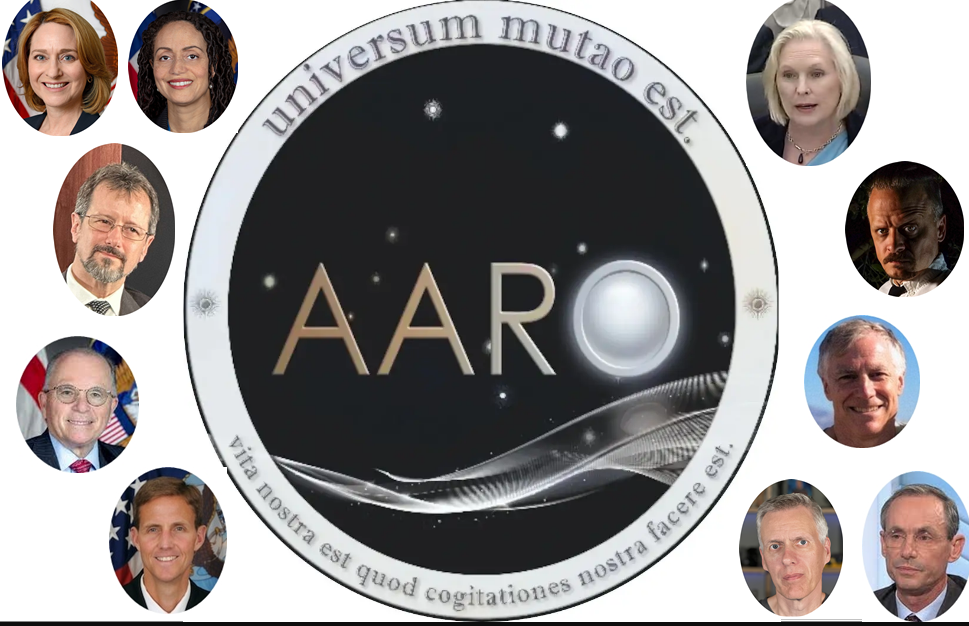
By Douglas Dean Johnson
@ddeanjohnson on X/Twitter [my gmail address is my full name, with periods between the names]
Initial publication date: June 7, 2024, 4:45 PM EDT. Any substantial revisions made after initial publication will be noted in a log at the end of the article. Readers of the email version of this article might have to click "view entire message" to see the final portions of the article, and must click "view in browser" to access embedded documents.
The All-domain Anomaly Resolution Office (AARO)– the Pentagon's UFO office--has been in business for nearly two years now, and it appears to be at a crossroads.
AARO has broken some new ground in UAP-related investigations, but it has also engendered multiple controversies, both among interested members of Congress and within the various UFO-focused communities outside of the government.
The AARO directorship has been vacant for more than six months, and by some accounts, those responsible for recommending a candidate have encountered difficulties. New legislation that would impact on AARO's operations is under active consideration in both houses of Congress. It seems like a good time to review some aspects of how AARO has performed over these past two years, and what may lay ahead for the office--offering not only my own assessments, but comments by a diverse array of observers.
Over the past month or so, I have sent AARO-related questions to people of widely variant perspectives who have publicly expressed views on AARO in the past, including Christopher Mellon, Sean Kirkpatrick, Kirk McConnell, Mick West, Tim Gallaudet, Steven Greenstreet, Matthew Pines, and Tim Burchett – all of whom answered. I even elicited a somewhat cryptic reply from the Office of the Director of National Intelligence.
However, my inquiries to Pentagon spokespersons Susan Gough and Eric Pahon, former intelligence officer David Grusch, potential AARO director Michael Waschull, and the offices of Senators Kirsten Gillibrand and Marco Rubio and Congressmen Robert Garcia and Jared Moskowitz, were among those that so far have gone unanswered. Also, the Inspector General of the Intelligence Community found unpersuasive my arguments as to why he should tell us what he is up to.
If I have occasion to update or revise this article with new responses or other new information, such revisions will be noted in a log found at the end of the article, as is my usual practice (no "stealth edits").
[UPDATE: On August 26, 2024, the Pentagon issued a release announcing the appointment of Jon T. Kosloski, Ph.D., as AARO director, "on detail from the National Security Agency." The release quoted Deputy Secretary of Defense Kathleen Hicks as stating, "Jon possesses the unique set of scientific and technical skills, policy knowledge, and proven leadership experience required to enhance AARO's efforts to research and explain unidentified anomalous phenomena to the Department, Congress, and the American people." The release also stated, "Under his leadership, AARO will continue to examine the U.S. government historical record relating to UAP, as well as efforts to declassify and release UAP-related records to the greatest extent possible." At the same time, the Pentagon posted a short biography of Dr. Kosloski.]
WHERE DOES AARO STAND, AFTER TWO YEARS?
Congress created an office solely to investigate "unidentified aerial phenomena" as part of the Fiscal Year 2022 National Defense Authorization Act (NDAA), enacted December 27, 2021 (Public Law 117-81). A year later, the FY 2023 NDAA (Public Law 117-263), enacted December 23, 2022, formally named the office the All-domain Anomaly Resolution Office (AARO), relabeled its focus as "unidentified anomalous phenomena," and made several changes intended to enhance the stature and broaden the mission of the office.
AARO officially launched on July 15, 2022, with Sean Kirkpatrick, Ph.D., a physicist and longtime intelligence officer, as its director. Kirkpatrick retired effective December 1, 2023. He now provides strategic scientific and intelligence consulting services under his own company, Nonlinear Solutions LLC, and also serves as the chief technology officer for Defense and Intelligence Programs within the National Security Sciences Directorate of Oak Ridge National Laboratory. Kirkpatrick continues to assist AARO, without pay, as a "subject matter expert," and has participated in several briefings for members of Congress in that capacity.
Since it is considered in part an intelligence office, the size of AARO's budget and staff are largely classified, although it seems safe to say that by Pentagon standards it is a fairly small enterprise. AARO is generally secretive about its inner workings– for example, the membership of an AARO "science and technology advisory group" has not been made public. AARO has no press spokesperson of its own; its interactions with the media are managed by Pentagon spokeswoman Susan Gough, who is not always easy to reach.
AARO also operates a website. It very occasionally issues short reports on UAP cases that the AARO staff and its anonymous technical advisors believe that they have "resolved." The office also maintains a seldom-used account on X (formerly Twitter): @DoD_AARO
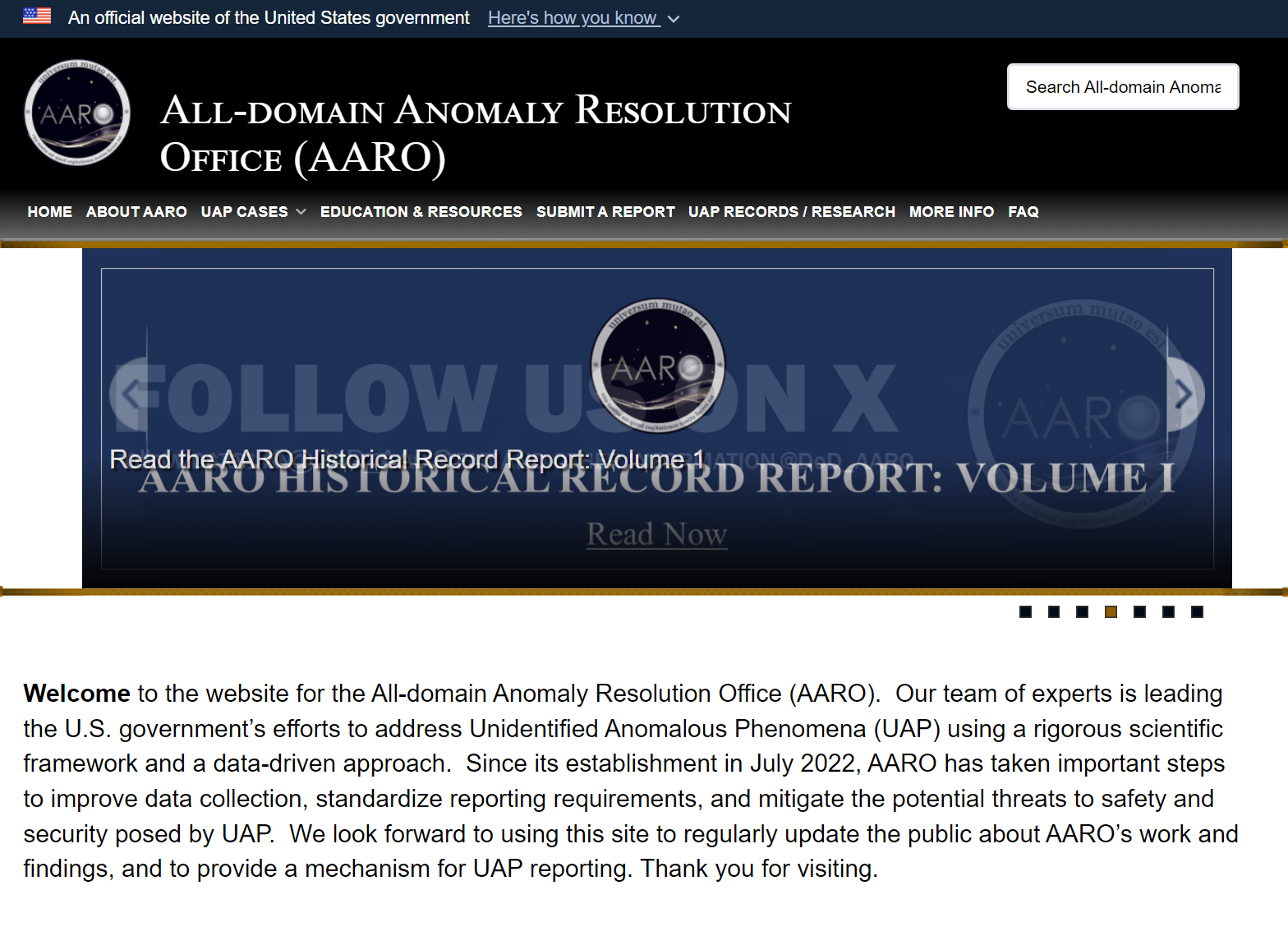
One of AARO's primary missions is to facilitate and consolidate UAP reporting from throughout the government, and to analyze events submitted by the military and intelligence agencies. In this capacity, AARO was involved in the development of a nine-page set of reporting guidelines that were transmitted to military commands worldwide by the Joint Staff of the Joint Chiefs of Staff, through what is known as a GENADMIN message, on May 29, 2023. This development was first reported by Brandi Vincent in an article in DefenseScoop on August 30, 2023. I submitted a FOIA request for the document the next day. It was released to me on March 18, 2024; I published it on X/Twitter the same day. My subsequent article about the GENADMIN, published March 26, 2024, is found here.
According to remarks by AARO Acting Director Timothy Phillips at a Pentagon press event on March 6, 2024, AARO has developed "a deployable, configurable sensor suite that we can put in Pelican cases," called GREMLIN, which is capable of "hyperspectral surveillance to try to capture these [UAP] incidents." This system is apparently intended for deployment to UAP hot spots reported by military components.
"AUTHORIZED REPORTING" AND HISTORICAL REPORT VOLUME I
The law enacted in December 2022 created a new, AARO-run system for "authorized reporting" by current or former government employees and contractors who believe they possess knowledge of government involvement with UAP, including any programs seeking to reverse-engineer recovered technology of nonhuman origin. I discussed the basic provisions of that law in an article initially published immediately after the final language emerged from closed-door negotiations.
The same December 2022 enactment mandated that AARO produce by mid-2024 "a written report detailing the historical record of the United States Government relating to unidentified anomalous phenomena," back to January 1, 1945, to include "a compilation and itemization of the key historical record of the involvement of the intelligence community with unidentified anomalous phenomena, including (I) any program or activity that was protected by restricted access that has not been explicitly and clearly reported to Congress; (II) successful or unsuccessful efforts to identify and track unidentified anomalous phenomena; and (III) any efforts to obfuscate, manipulate public opinion, hide, or otherwise provide incorrect unclassified or classified information about unidentified anomalous phenomena or related activities."
AARO Director Kirkpatrick released Volume I of the historical report months before the statutory deadline – in early March, 2024. Formally titled the Report on the Historical Record of U.S. Government Involvement with Unidentified Anomalous Phenomena (UAP) Volume I (cover date February 2024), a classified version went to designated congressional committees, and an unclassified version was released publicly. The report was largely prepared prior to Kirkpatrick's retirement on December 1, 2023, and he has been identified as its primary author. Since his retirement, Kirkpatrick has authored multiple opinion essays and given many media interviews, elaborating on his views regarding UAP in general and alien-tech reverse-engineering stories in particular. He has also responded to a number of questions that I put to him by email.
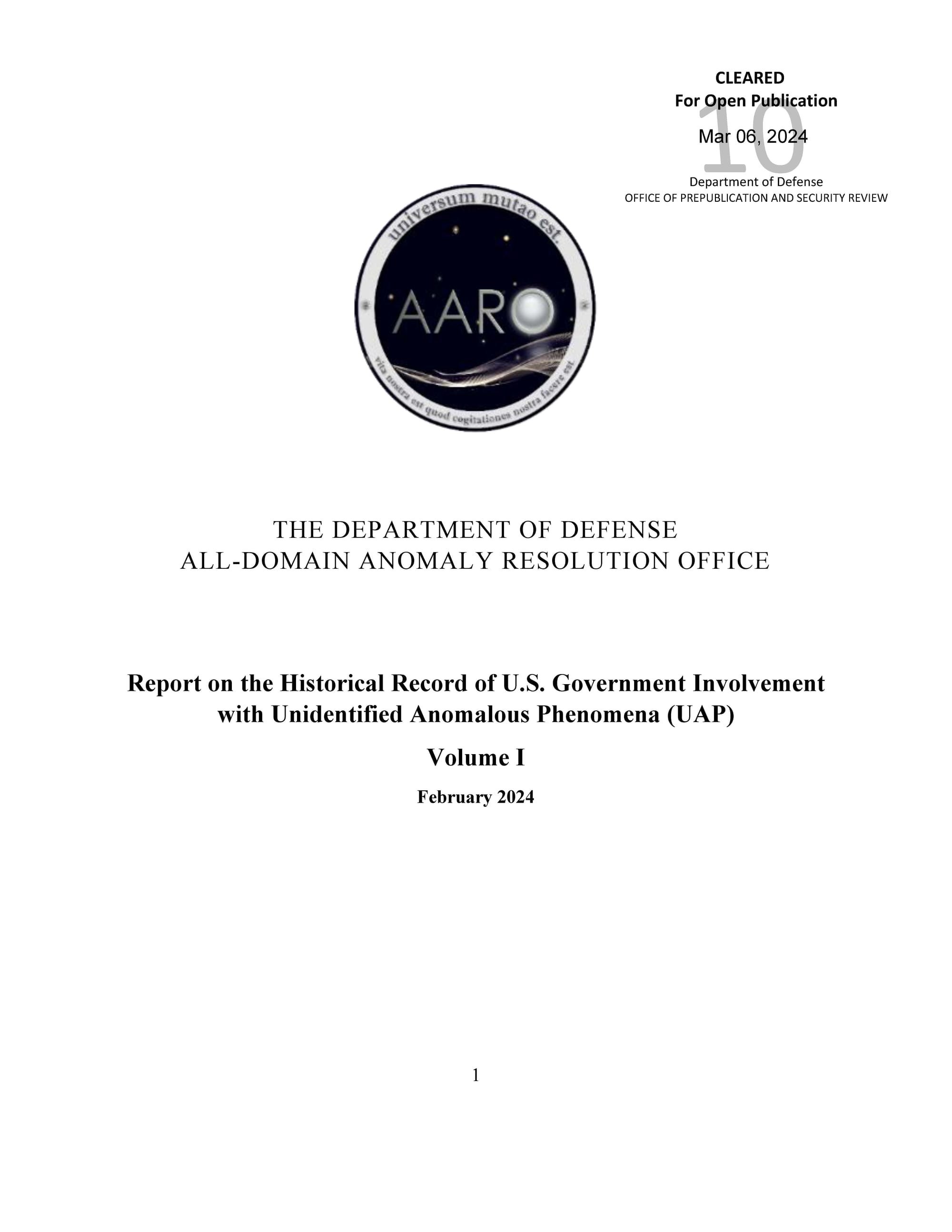
The unclassified version of the AARO report purports to give an overview of past government programs dealing with UFOs. It seems to me that this document conflates two subjects that I consider distinct: observations of apparently non-prosaic UFOs and their associated effects, versus stories of nonhuman technology and/or bodies in government and/or corporate custody. I consider the cumulative evidence for the former to be very substantial, and the evidence for the latter weak (with specific claims about recovered non-human technology having a strong tendency to disintegrate when subjected to competent critical scrutiny). Still, if the government really does have some non-human technology squirreled away somewhere, I think we have a right to know about it, so every story presented by a cooperative claimant who displays a modicum of credibility should be checked out.
I am among those who find the general history of government involvement in UFOs, as presented in the AARO Volume I report, to be seriously deficient in many respects, especially as to period prior to 2009. The report falls very far short of the comprehensive history mandated by the law. Much of the discussion is superficial. There are huge gaps. The report fails to address or explore known and potential document troves, both public and classified, including those dealing with nuke-associated cases.
There are also lapses in discernment– for example, treating as highly credible an evidence-free and widely criticized 1997 article by a CIA employee attributing a large portion of UFO reports, during an extended period, to sightings of the U-2 spy plane. In addition, there are many careless errors, and not a little fluff.
With respect to the gaps and some of the other deficiencies, I am in very general agreement with many of the points made in critiques that have been published by Christopher Mellon, John Greenewald, Barry Greenwood, among others. Hopefully at least some of these deficiencies will be corrected in the future, but that would require adjustments in mindset and recourse to a broader range of expertise from outside the government. It would also require statutory and administrative changes to provide much more time and greater staff resources. Alternative approaches to uncovering UAP-related government records (and artifacts, if they exist) are under consideration in Congress. [1]
However, I believe that the AARO Volume I historical report did produce important new data on a subject that has come to dominate much of UAP-related public discourse in recent years– claims that the government holds craft or other technology created by nonhumans, and alien cadavers. Such claims reached a new level of visibility in mid-2023 with public testimony before a subcommittee in the U.S. House of Representatives by controversial retired intelligence officer and whistleblower David Grusch, and a series of media appearances by Grusch. [1A] Although Grusch deflected AARO's requests to interview him under the "authorized disclosure" protections provided in law, AARO's interviews and investigations produced substantial and specific new information pertaining to the subject of so-called "crash retrievals" and purported reverse-engineering programs. [2]
[UPDATE: A report by reporter Brandi Vincent that appeared on DefenseScoop.com on August 26, 2024, quoted Pentagon spokesman Major General Pat Ryder saying that officials at AARO “continue to conduct their review [for volume two of the historical review], but we don’t have anything further to announce in terms of the timing of the report at this time."]
THE KEY ASSERTIONS OF THE AARO VOLUME I REPORT– WHO STANDS BEHIND THEM?
The AARO Volume I historical report set forth three key assertions [3]:
● "AARO found no empirical evidence for claims that the USG and private companies have been reverse-engineering extraterrestrial technology.....AARO assesses that the inaccurate claim that the USG is reverse-engineering extraterrestrial technology and is hiding it from Congress is, in large part, the result of circular reporting from a group of individuals who believe this to be the case, despite the lack of any evidence." (pp. 7, 9)
● "AARO has found no evidence that U.S. companies ever possessed off-world technology. The executives, scientists, and chief technology officers of the companies named by interviewees met with the Director of AARO and denied on the record that they have ever recovered, possessed, or engaged in reverse-engineering of extraterrestrial technology." (p. 8)
● "AARO found no evidence that any USG investigation, academic-sponsored research, or official review panel has confirmed that any sighting of a UAP represented extraterrestrial technology." (p. 7)
[All page numbers refer to the unclassified version of the report– obviously!]
In considering AARO's assertions that claims that the USG is reverse-engineering extraterrestrial technology are false, and that no U.S. government investigation has ever "confirmed that any sighting of a UAP represented extraterrestrial technology," it seems to me that one very important question is: What level of government authority "stands behind" these assertions?
Consider: Congress has in recent years enacted multiple laws making it very clear that if the government does possess any non-human technology, then designated lawmakers insist that they must receive detailed information about it. In addition, in December 2023 two provisions were enacted (within Public Law 118-31) to explicitly prohibit expenditure of funds on any related activity unless such congressional notifications have been delivered. Now, in response to all that, a component of the Executive Branch has delivered a classified report to Congress, and an unclassified version to the public, that says in effect: We have looked, and we have found no such thing. Every story that we investigated turned out to be a misunderstanding or flat out false. Your government sees no evidence of non-human visitation.
So then– who says so? Are Congress and the public being told these things merely on the authority of a single civil servant, holding substantial scientific credentials but also displaying a measure of bias, and also constrained to produce assessments within a very limited time frame and with very limited resources? Or, are Congress and the public being presented with these conclusions with the full backing of senior government officials– at a minimum, officials appointed by the President and confirmed by the Senate?
In a long critique of the AARO report that appeared in The Debrief on April 12, 2024, Christopher Mellon, a former assistant secretary of defense for intelligence, characterized the report as the merely the expression of "a mid-level official or organization." Mellon asserted that if the government actually had clear evidence of extraterrestrial visitation, the revelation of that information to the public could only come from a much higher level: "Only the President, or an independent Congressional investigation, could reasonably be expected to reveal such a profound and transformative issue. If Congress wants to be confident it knows the truth, it needs to conduct its own independent investigation."
However, by a provision of a statute enacted in December 2022 (FY 2023 NDAA, Public Law 117-263), the AARO Director now reports directly to the Deputy Secretary of Defense and to the Principal Deputy Director of National Intelligence, the second-ranking officials in those agencies. The AARO Director is appointed by the Secretary of Defense, in consultation with the Director of National Intelligence– who are the cabinet-level officials for those realms. And again, the "historical report" is not merely a document cooked up by a federal agency on its own volition, but is a formal response to an array of explicit congressional mandates. Given that unprecedented context, it seems to me that the key assurances contained in the AARO Volume I report are not merely the expression of a "mid-level official or organization," but were in effect assertions presented to the Congress and to the American public in the name of and with the authority of the highest levels of the Department of Defense and the Intelligence Community,
If that is so, that does not necessarily mean that the assertions are accurate– but it does make it an even bigger deal if any of them turn out to be fundamentally wrong.
Hypothetically, if it turned out that some component of the government or a government proxy really does possess technology that it has reason to believe is of non-human origin, or has very compelling evidence that such technology is operating in Earth's atmosphere or oceans, then either very senior government officials are now flat-out lying to Congress about it, or the secret would be held only by a group so select that it is hard to envision it as existing within our system of government.
Hypothetically, it is conceivable that some lawyers within the Executive Branch might construct a legal theory under which such world-shaking information could be concealed even from cabinet-level officials, with that action being legally justified as an exercise of the President's intrinsic constitutional power to protect national security. One might imagine that such a legal rationale could even be extended to justify a President ordering senior officials to misinform Congress or arrange for subordinates to do so – although the legality of such hypothetical actions would no doubt be sharply disputed by many within the Legislative Branch and elsewhere.
All of that, to my mind, is a very big stretch. And to have even a color of legality, in my opinion, such presidential interventions would have to be contemporary– please, let's have no nonsense about the whole thing being on auto-pilot since a secret order by President Truman, or being governed by a memorandum from some Secretary of the Air Force in the 1950s. And by the way, the notion that anyone in the government has legal authority to refuse any President secret information on grounds that he does not have "a need to know" is complete constitutional rubbish. [3A]
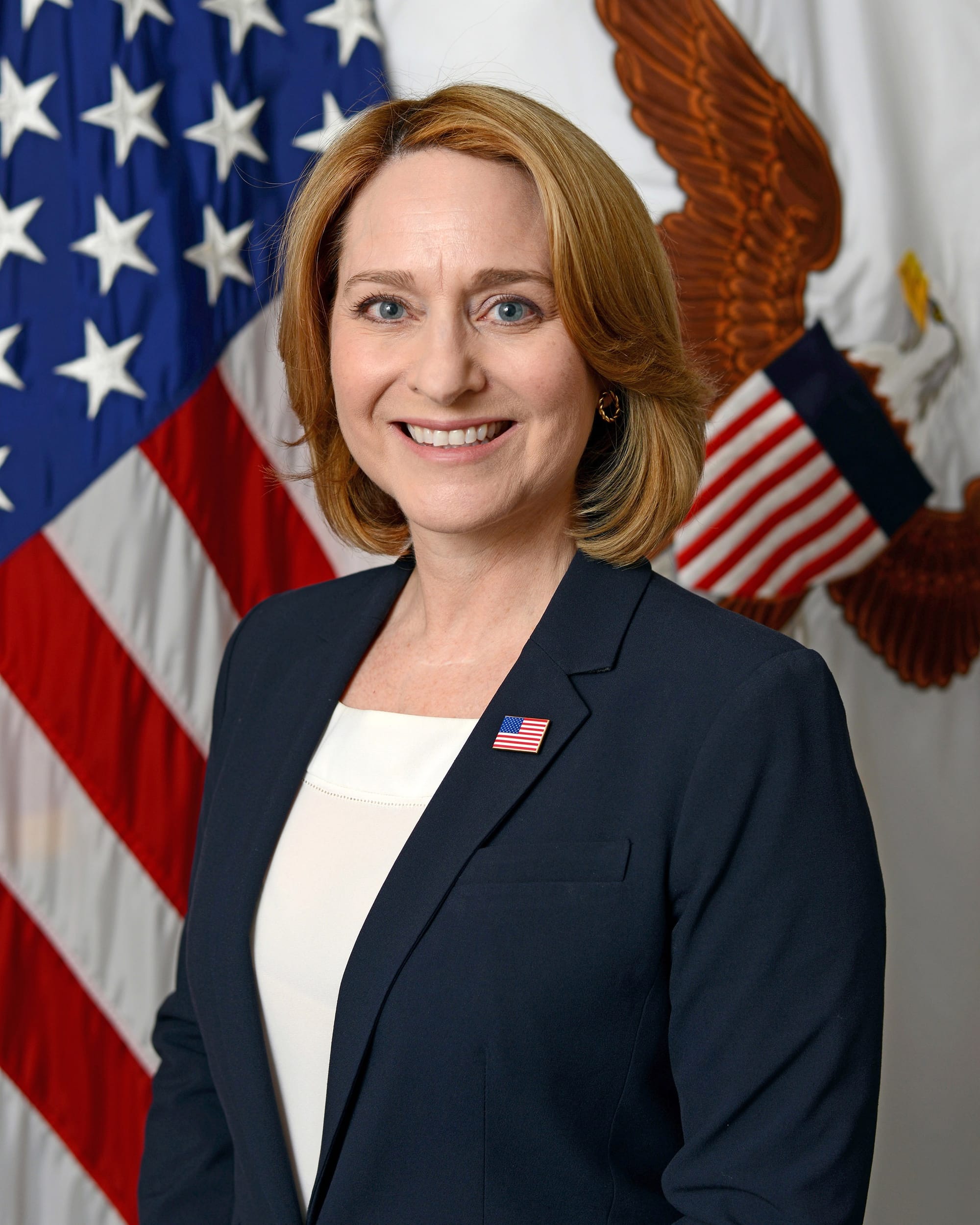
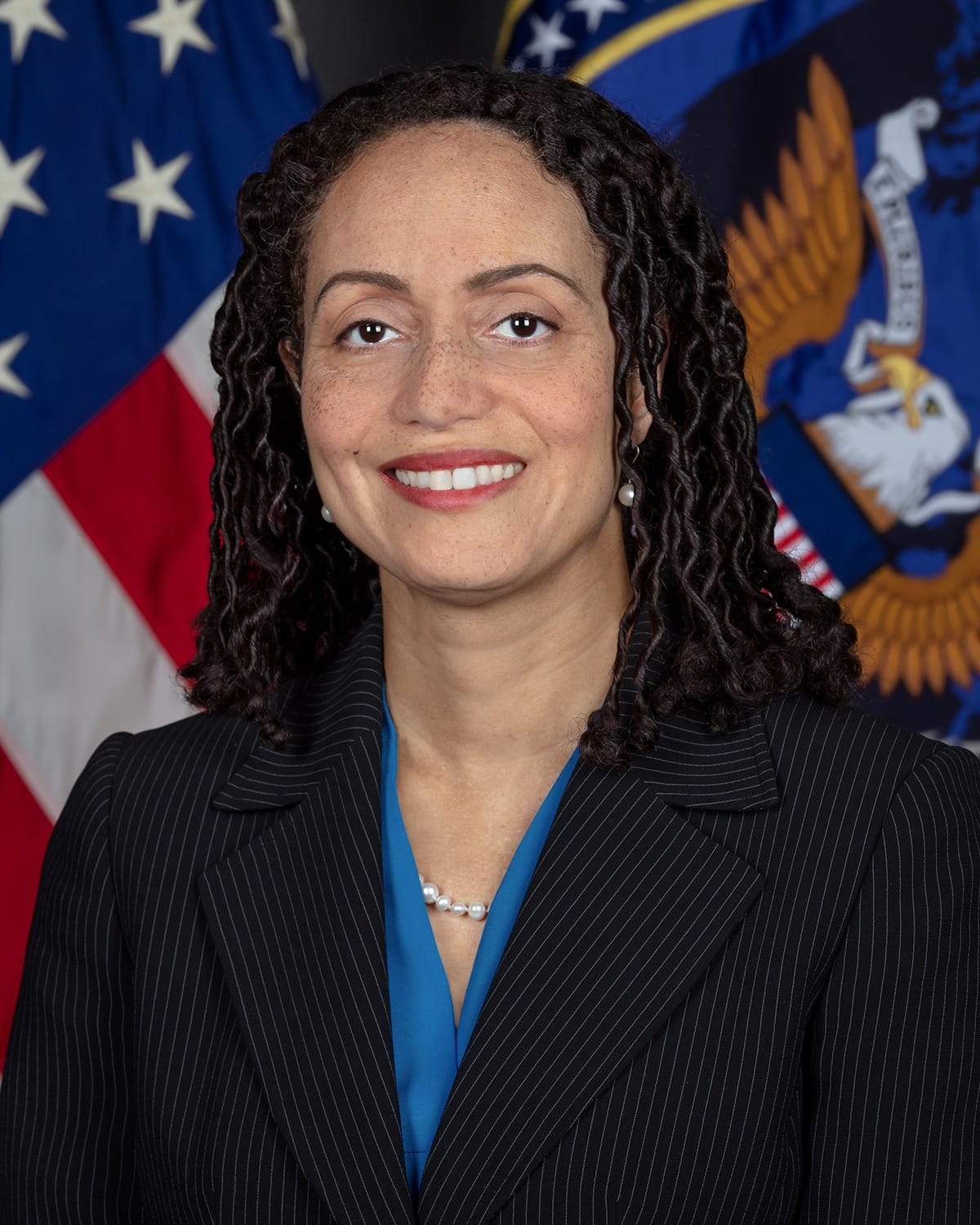
Deputy Secretary of Defense Kathleen Hicks (left or top) and Principal Deputy Director of National Intelligence Stacey Dixon, Ph.D. (right or bottom). Beginning in 2023, the AARO Director reports to these two officials, each second-ranking in their agencies, on all "operational and security matters."
But this brings us back to the question: Who is it that is telling Congress that the government knows nothing of any nonhuman technology?
Christopher Mellon noted in his April 12 critique that "this appears to be the first AARO report submitted to Congress that the Director of National Intelligence (DNI) did not sign off on. I don’t know why, but [Director of National Intelligence] Avril Haines and her Office were quite right not to in this case, having spared themselves considerable embarrassment in the process."
After I read that, I thought it would be a simple matter to obtain explicit statements that senior officials of the Office of the Director of National Intelligence and the Department of Defense endorse the key findings of the AARO Volume I report. To my puzzlement, that has proved not to be the case. Four times from March 21 to April 25, 2024, I submitted the following question to the appropriate official Pentagon spokespersons, without receiving any response: "Does Deputy Secretary of Defense Kathleen Hicks endorse AARO's assurances that (1) the 'claim that the USG is reverse-engineering extraterrestrial technology and is hiding it from Congress' is false, and (2) no U.S. government investigation has ever 'confirmed that any sighting of a UAP represented extraterrestrial technology'?"
As of the date of initial publication of this article, I have yet to receive a reply regarding whether Deputy Secretary Hicks endorses those key findings. [4]
I will note, however, that at a general press briefing on March 8, 2024, the day after the AARO report was made public, Department of Defense Press Secretary Major General Patrick S. Ryder did seem to present the AARO report as speaking for the Department of Defense as a whole, using terminology such as "what we found..."
I also submitted two questions to the Office of the Director of National Intelligence (ODNI), initially on March 22, 2024. These were my questions:
Do the Director of National Intelligence and the Principal Deputy Director of National Intelligence support the findings and conclusions of the UAP historical report issued by AARO– in particular, AARO's findings that no U.S. government investigation has ever "confirmed that any sighting of a UAP represented extraterrestrial technology," and that "AARO has found no empirical evidence for claims that the USG and private companies have been reverse-engineering extraterrestrial technology"?...If ODNI is not able to provide such a statement of support on behalf of the Director and the Principal Deputy, please elaborate on any procedural or substantive barriers that prevent such an endorsement.
After a number of polite postponements, on April 25, 2024, I received this single-sentence response from an ODNI spokesperson:
ODNI fully supports AARO’s UAP work and looks forward to the publication of the Historical Record Report, Volume 2.
The discerning reader will note that the ODNI response artfully sidestepped my explicit questions regarding the two key findings presented in the AARO Volume I report. Indeed, ODNI did not comment directly on AARO's Volume I at all. [5]
After receiving that odd reply from ODNI, I asked Sean Kirkpatrick for his take on my failure to elicit clear endorsements from the Pentagon or ODNI. In an email dated April 27, 2024, Kirkpatrick wrote:
As you note, by statute, the Director reports to both PDDNI [Principal Deputy Director of National Intelligence] and DSD [Deputy Secretary of Defense]. The delay in sending out Vol 1 from the time my team and I finished it, was solely due to both PDDNI and DSD staffing for their review and approval. Putting aside his demeaning attitude, Mellon [in his critique in The Debrief] clearly wasn’t reading the legislation very well, as the statute says the Director of AARO signs off on the Historical Report, not the DSD and PDDNI. However they [DSD and PDDNI] have to approve it. Which is what they did prior to release and delivery. As for the timeliness of responses to your queries [to the Pentagon and ODNI spokespersons] I’m going to guess that other world events took precedence. I think you might be reading too much (or little) into the DNI response. I also know that several folks have been in and out on personal leave in both organizations. The report was endorsed by both of my bosses – the DSD and the PDDNI. The findings and the evidence are clear.
On a somewhat related matter: In an email to me on April 22, 2024, Kirkpatrick said he believed that no agency in the Executive Branch, other than AARO, is investigating allegations that the government is associated with a non-human technology reverse-engineering program.
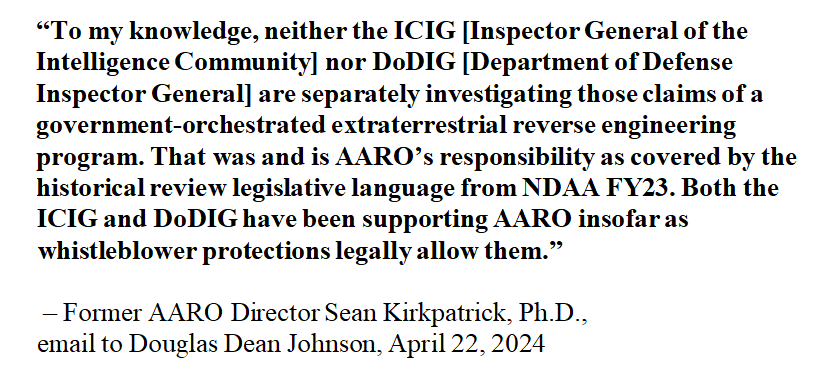
Kirkpatrick's April 22 statement ran counter to the perception among many UFO-interested members of the public, and some members of Congress, that the Inspector General of the Intelligence Community (ICIG) has been investigating the allegations of now-retired intelligence officer David Grusch, who filed an "urgent concern" whistleblower complaint with the ICIG in May 2022. Grusch said publicly that he had presented the ICIG with detailed information he had assembled, while still in the government, about government-run non-human technology reverse-engineering programs that had not been reported to Congress.
Some well-placed sources on Capitol Hill have suggested to me that Kirkpatrick's perception of the ICIG situation is probably correct. However, some commentators outside the government, such as journalist-advocate Ross Coulthart, continue to assert that the Inspector General of the Intelligence Community is actively investigating the Grusch reverse-engineering allegations. Grusch himself said, in a statement to NewsNation on March 3, 2024, "I trust in the investigative and law enforcement/ criminal referral authorities ICIG has independent of DoD oversight," but he did not explicitly claim knowledge that the ICIG is in fact still actively engaged in such an investigation.
In my view, this remains an open question.
In emails to the public affairs office of the Inspector General of the Intelligence Community, I quoted various conflicting statements about what the ICIG is doing about the Grusch allegations, and urged the ICIG to clarify the situation. I received my answer on May 29, 2024: "The IC IG has no comment."
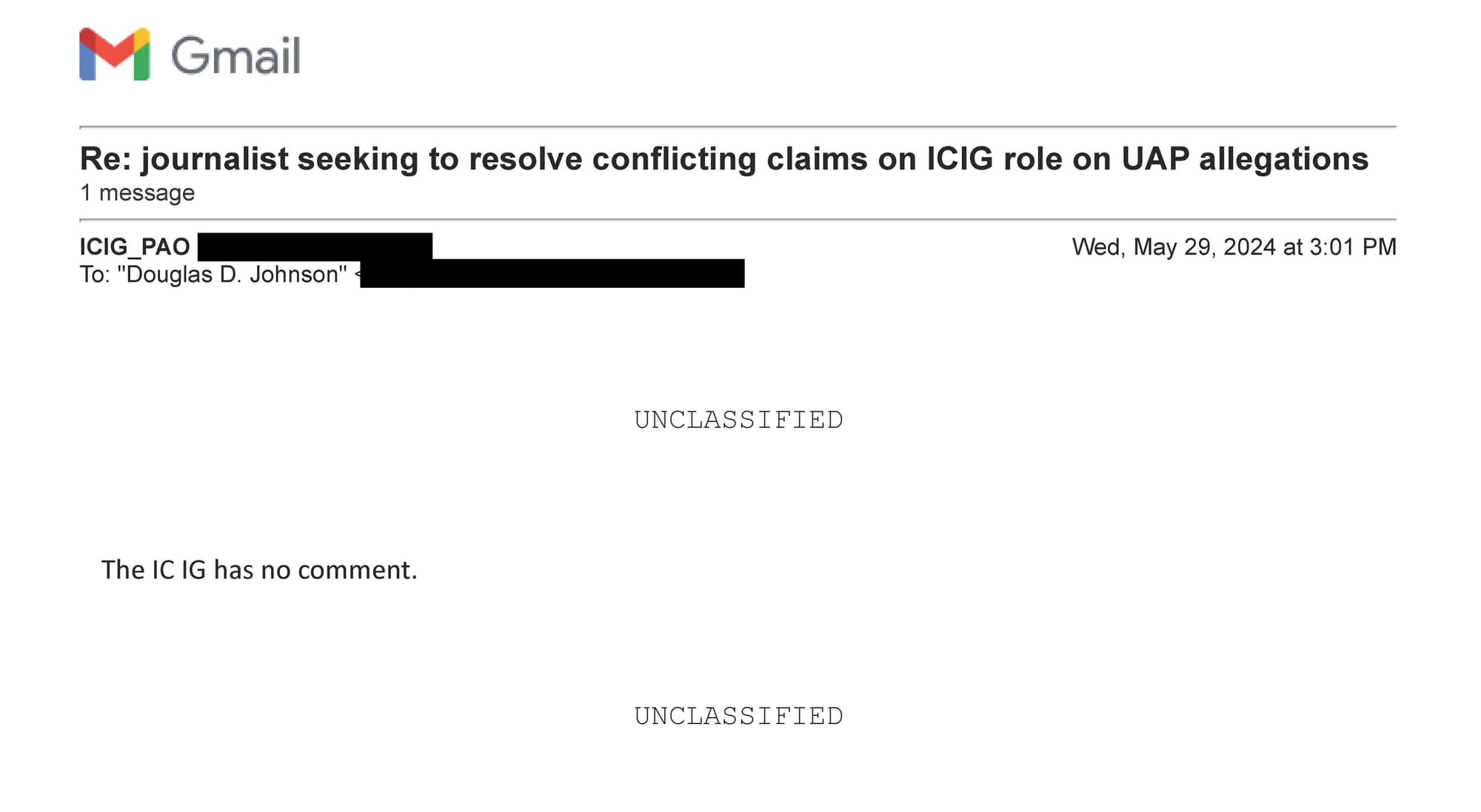
While some will strain to read this "no comment" as an implicit confirmation that ICIG agents are out there knocking on doors looking for a reverse-engineering program unknown to Congress, I think it actually tells us nothing. [6] [7]
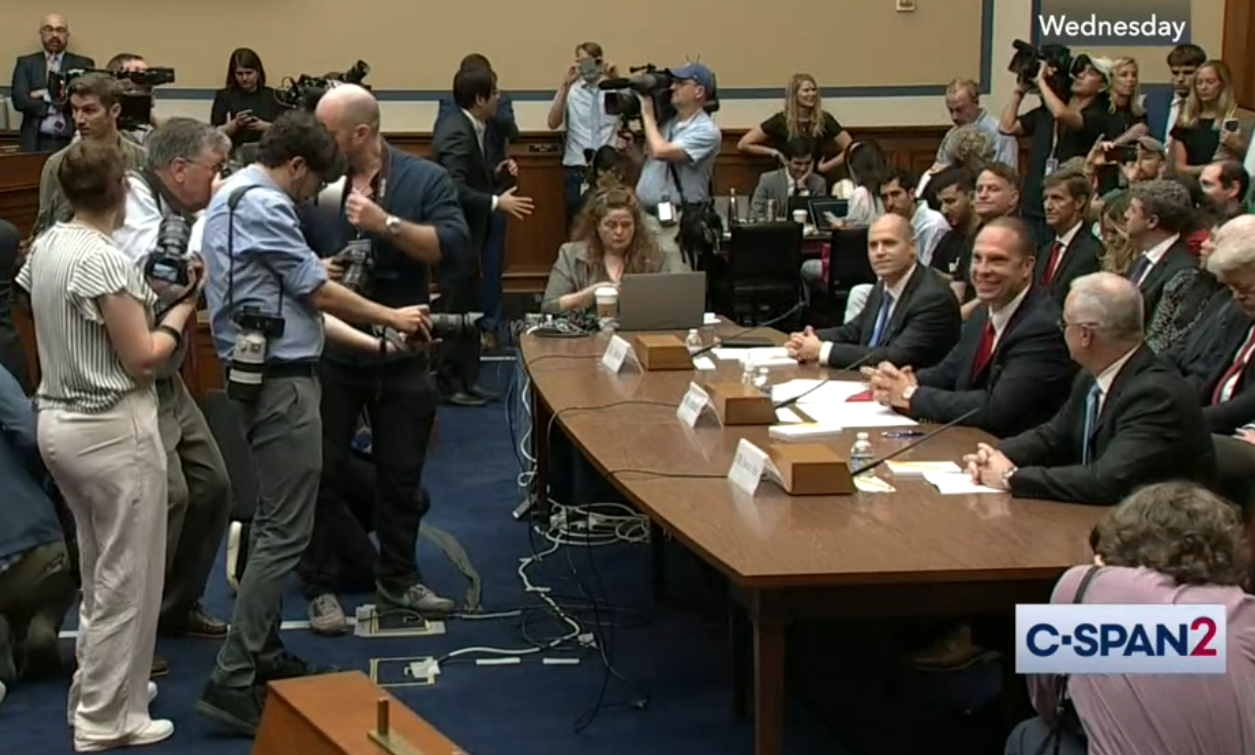
WILL AARO CONTINUE TO INVESTIGATE CLAIMS OF HIDDEN REVERSE-ENGINEERING PROGRAMS?
In various interviews, Sean Kirkpatrick described AARO's task of investigating alien-artifact, reverse-engineering allegations as flowing from Congress's mandate to AARO to do a historical study (part of Public Law 117-263, enacted in December 2022). Kirkpatrick is correct that the mandated historical study did explicitly encompass "any program or activity that was protected by restricted access that has not been explicitly and clearly reported to Congress...any efforts to obfuscate, manipulate public opinion, hide, or otherwise provide incorrect unclassified or classified information about unidentified anomalous phenomena or related activities." And that law set an end date for AARO to produce a report on its historical findings– mid-June, 2024.
Kirkpatrick also has suggested, in post-retirement interviews, that AARO should now be allowed to turn its energies completely to investigation of ongoing UAP events. In an appearance on the Science Quickly podcast with Daniel Vergano (February 5, 2024), Kirkpatrick said that the historical investigation mission "certainly takes away from the more salient and concerning mission, the operational mission of the here and now....I would probably still be there [at AARO] if it weren’t for this irrationality and this cloud of conspiracy that detracts from the real mission." In an opinion piece published by Scientific American (March 6, 2024), Kirkpatrick wrote that Congress "unfortunately" added the historical investigation mission to AARO's actionable-information mission, but now "It is time for...Congress to step up to the plate and enable AARO to finish its mission absent this distraction." AARO Acting Director Timothy Phillips has at least implied similar sentiments. [8]
But it is clear from review of Public Law 117-263 that Congress intended AARO's investigations of possible government-linked UAP programs, past or present, to be a continuing enterprise, extending beyond the time-limited historical study. That law created the secure system for AARO to receive "authorized reporting" or "authorized disclosure" of specified types of UAP-related information, and the mandate for that system has no expiration date. The law quite clearly provides that interviewees within this secure system can legally provide, and AARO can legally receive, information at any level of classification, notwithstanding any previous non-disclosure agreement and without violating any regulation or order issued under the authority of Executive Order 13526 (the executive order that establishes general classification procedures), the Atomic Energy Act, Section 798 of Title 18 of the U.S. Code, "or other provision of law relating to the disclosure of information."

Key members of Congress clearly do not feel that the job of searching for government-held UFO data is finished.
Senator Mike Rounds (R-SD), who sits on both the Armed Services and Intelligence committees, was interviewed by journalist Matt Laslo (@AskaPol_UAPs) on May 21, 2024. Rounds said:
From what I can see, I think, they [AARO] are getting invited into areas where they're getting access to more and more information...I don't know if we've solved the problem of the silos that you find within DOD [Department of Defense] where everything is so secretive at the special access level, between the IC community [Intelligence Community, the array of 18 U.S. intelligence agencies] and the DOD community, in general, that there is not a lot of overlap between folks who see the different programs. And, I think, AARO is recognizing that. And I think they're probably going to be able to shed some light without threatening national security with some of the information.
Asked by Laslo, "Are you confident that Congress now knows of every SAP [special access program]?," Rounds answered "No...I'm not confident yet.” Asked by Laslo, "Are you confident that AARO is on the hunt?," Rounds responded:
I am. I think the preponderance of the evidence is that AARO is on the hunt. Time will tell whether or not they are successful in actually getting into and asking the right questions. I think part of it is, you have to ask the right questions to the right people in the right setting in order to get an answer....I'm not saying that I have full confidence in it. I'm just saying, right now, the evidence is that they're trying hard and that they seem to be making some inroads, but time will tell and we're not going to let up on our interest in it. Hopefully, we're successful in maybe answering some of those questions.
Likewise, on May 2, 2024, Senator Kirsten Gillibrand (D-NY), who also sits on both the Intelligence and Armed Services committees, told Laslo, "Oh, it's definitely not case closed. I think that their [AARO historical] report was just that their analysis of everything they were shown and everyone they talked to, they had no basis to say there's a secret program. But of note, the two whistleblowers that I've met with did not meet with AARO and refused to meet with AARO. And so maybe the next director they'll meet with, but I can't assess them unless AARO can talk to them..."
It seemed to me that if there are indeed credible but skittish whistleblowers in the wings, perhaps the prospects for bringing them forward were not enhanced by some of the statements made by Sean Kirkpatrick in post-retirement interviews. For example, in a March 14, 2024 interview with Chris Williams of the Moorman Center for Space Studies, National Security Space Association, Kirkpatrick said, "I think the thing that is most troublesome to me is the number of people that are in government that I may have worked with for decades that I did not know had that belief until they sat down in my office and told me, I'm not going to help you because you are part of the government coverup of all the alien technology. And for somebody who I've known for a while and worked on highly sensitive national security problems on, to say that without evidence as a belief is disturbing and should be a flag for the national security community, because how can you then trust those people if they are not objective enough to understand...lack of evidence in those, how can you trust them with our national secrets?"
Kirkpatrick made similar comments in an interview with Steven Greenstreet of the New York Post, posted on May 8, 2024.
With this in mind, on May 22, 2o24, I submitted these questions to Sean Kirkpatrick:
(1) I understand some of your public statements to assert that there is "no evidence" of nonhuman agency as a plausible explanation for any UFO incidents, and to dismiss as irrational any government security professional's belief that some components of the federal government possess knowledge or artifacts of nonhuman technology and are actively concealing that information from designated members of Congress (and, of course, from the public). Are these accurate summaries of your views? If so, how do you respond to observations that such sweepingly dismissive statements will deter potential witnesses/whistleblowers from approaching AARO to tell their stories, and thereby impede AARO's ability to perform one of the key missions which Congress has entrusted to AARO– the gathering and objective investigation of accounts pertaining to technologies of nonhuman origin?
(2) Among the widely diverse ranks of persons who believe there is evidence that some UAP are manifestations on nonhuman intelligence, it is now common to encounter degrees of skepticism regarding AARO's objectivity, and in some quarters, even negative judgments about AARO's authenticity and good faith. What can be said or done by current or future AARO leadership to assure persons with credible backgrounds that if they approach AARO, their stories (however remarkable) will be recorded methodically and taken seriously, that their testimony will be investigated aggressively and employing the full investigative authorities that Congress has conferred on AARO, and that those who participate will not end up branded as alien-believer security risks?
On June 7, 2024, Sean Kirkpatrick responded to those questions by email, as follows:
First, I am certain you can discern the two whistleblowers that Gillibrand referred to. One of which has been quite vocal in the media about his lack of engagement with AARO, the evidence of which was released with a FOIA request about a month ago. We discerned all of the relevant information he and the other one have provided Congress but not AARO through investigations of their sources, and other interviewees who came forwarded to discuss their interactions with those individuals. Sen Gillibrand and I have spoken about that often, and while we both agree we believe we covered all of the ground, we cannot say 100% unless they come forward to discuss. [9]
Your first question/summary is not quite accurate. I dismiss as irrational and unprofessional any national security official who comes forward with a story to the Congress or the public, who believes and propagates such a conspiratorial allegation without any evidence. I also caution as a risk any national security professional in a position to obstruct, interfere, or otherwise affect AARO because of their unfounded belief. Evidence is more than “I heard this, or I read this, or I believe this.” Even if they say “I was there and this is what I saw” there needs to be enough details provided to investigate. Names, places, dates, specific buildings, documents, anything. Everything that anyone presented to us was proven to be either false, misinterpreted, and mistaken identity. So in light of that summary of my conclusions from investigating these allegations, my message to people is come forward with your story, but be prepared to provide your evidence. National security professionals should know better.
As for the second one [question], I don’t think there is anything that is going to be said to convince the people who believe in the conspiracy that AARO is going to pursue the truth. That’s never going to change because the truth conflicts with their belief. That is the irrationality I will fight against.
HOW MUCH DOES AARO MATTER?
I encountered a considerable range of views, among those who follow UAP-related government policy closely, regarding the value of AARO, how much it matters who runs AARO, and how AARO should modify its operations in the future.
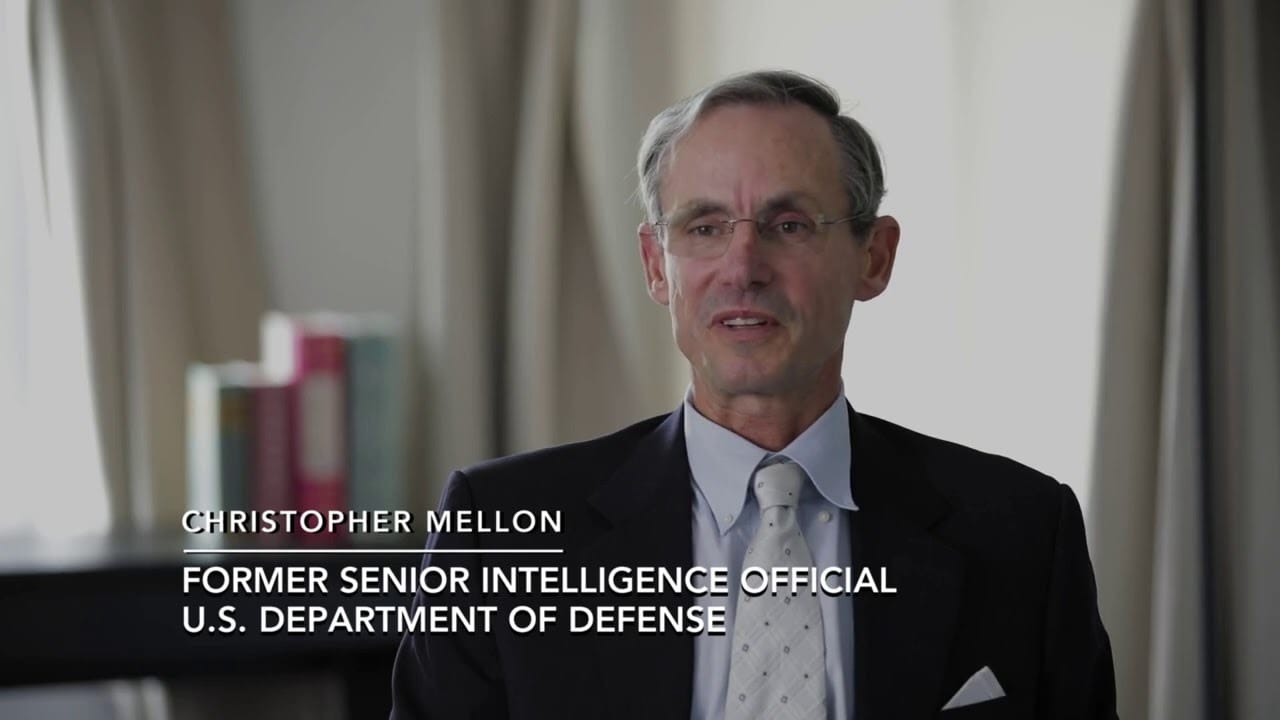
Christopher Mellon, @ChrisKMellon, former deputy assistant secretary of defense for intelligence and a leading proponent of increased government openness about UAP matters, told me by email (May 30, 2024):
It is hard to overstate the importance of the AARO Director position in an era when unmanned vehicles in the air and at sea and in space are proving so dominant in military operations....Even here in the U.S. we are finding mysterious unmanned vehicles interfering with US military operations. AARO’s efforts are crucial to helping the nation avert strategic surprise. Finally, the topic of UAP is one of several controversial national security issues undermining faith in the truthfulness and honesty of our government. It is important to address, and where possible, mitigate those concerns....
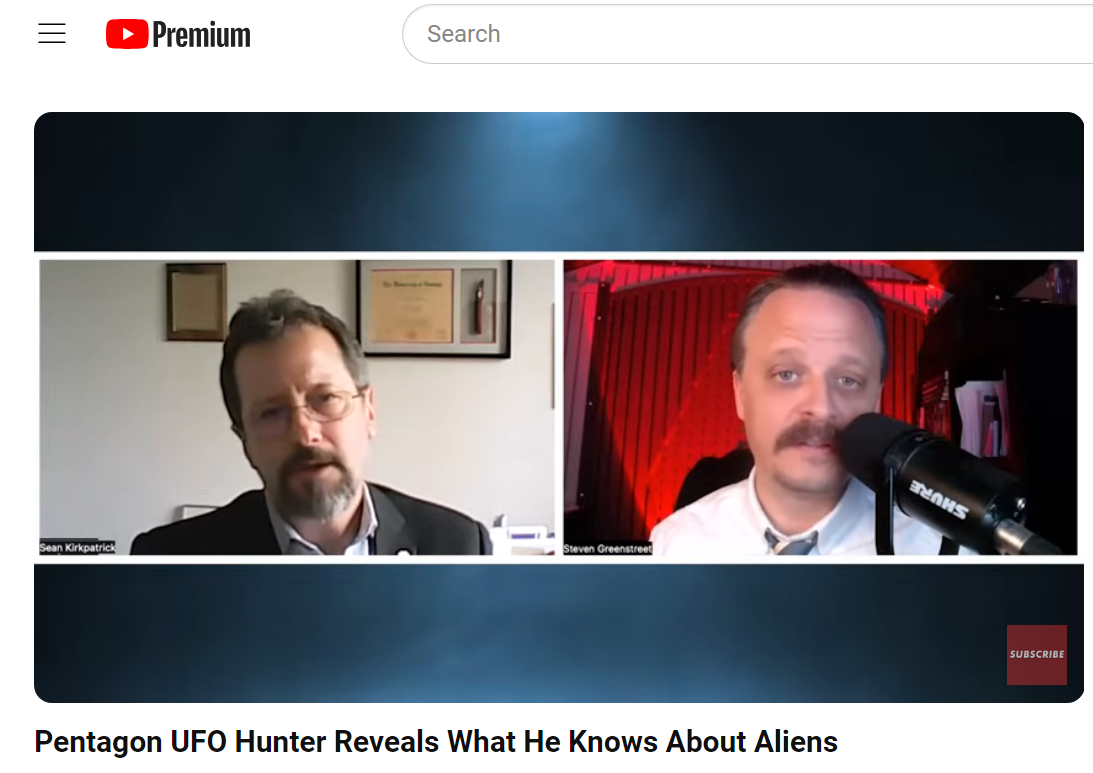
Steven Greenstreet, @MiddleofMayhem, is an advocate-journalist with the New York Post who is caustically dismissive of all claims of nonhuman entities interacting with humans, whether in the form of UFOs or otherwise. In a response that he sent me on June 2, 2024, Greenstreet indicated that his attitude towards AARO had evolved.
My initial perception was based on the Pentagon's track record with AAWSAP/AATIP and UAPTF - two programs that spun out of control with baseless paranormal nonsense. Because some of the same people from AAWSAP/UAPTF were involved in lobbying Congressional leaders to create AARO, I expected more of the same.
AARO was mandated by Congress to chase the baseless claims of dubious UFO proponents. My original perception was that AARO was perhaps staffed by credulous folks who felt such pursuits were worth taxpayer resources. But I think it's clear they simply didn't have a choice. Sean Kirkpatrick seems to have had the unenviable task of balancing a Congressional mandate to investigate 80 years of "historical" UFO nonsense while also keeping up with current "operational" UAP incursions. My reporting has revealed the former has been a giant distraction from the latter. As such, if AARO can put the unfounded (and distracting) UFO stories to bed, and focus on fact-based (and potentially dangerous) UFO incursions instead, that seems a worthy goal.
[Note: AAWSAP, the Advanced Aerospace Weapon System Applications Program, was a $22 million federal contract program instigated by Senate Majority Leader Harry Reid (D-NV) that studied UFOs and some other things, mostly during 2009-2010. AATIP (Advanced Aerospace Threat Identification Program) originally was an alternative name for AAWSAP. According to the AARO Volume I report, "after AAWSAP was cancelled, the AATIP moniker was used by some individuals associated with an informal, unofficial UAP community of interest within DoD that researched UAP sightings from military observers as part of their ancillary job duties. This effort was not a recognized, official program, and had no dedicated personnel or budget." (p. 22) The UAP Task Force, or UAPTF, was a small inter-agency group originally set up at the direction of the Senate Armed Services Committee in 2019, formalized by the Pentagon on August 4, 2020, and now superseded by the statute-based AARO.]

Thomas "Kirk" McConnell, who recently retired after many years as a professional staff member for the Senate Armed Services Committee, told me: "AARO was a new, congressionally mandated organization that DoD did not want, which makes progress difficult, even with the best management and intentions. Depending on one’s perspective, AARO is a glass partially filled or substantially empty."
McConnell also said:
AARO, with support from the Deputy Secretary, must take decisive steps to deploy sensors able to detect, track and characterize the UAP incursions in and around DOD facilities, bases, training areas, testing areas, etc. Chairman Reed and Ranking Member Wicker [Senate Armed Services Committee Chairman Jack Reed, D-RI, and ranking Republican Roger Wicker, R-MS] have put a stake in the ground that DOD needs to be able to answer the “who, what, where, and how” questions pertaining to these objects, and counter these incursions, which still regularly occur off our coasts, and at interior bases like Langley, Luke, Hill, the Pacific Northwest area, and elsewhere. We need comprehensive and constant surveillance to definitively characterize these threats.
AARO needs to change its standards for what constitutes “credible evidence.” The previous director would accept nothing less, it seems, than pristine raw calibrated scientific-grade sensor data (even though AARO made little progress in developing and deploying affordable sensor suites that could provide such data, and usually the data from military systems recording UAP encounters has almost always subsequently “disappeared”). He tended to denigrate witness accounts as unreliable even from highly trained and completely credible military service members — people who are responsible for life and death decisions in conflicts and whose testimony in law courts would be relied upon to decide whether citizens go to jail or not. AARO’s characterizations of eye-witness accounts discourages witnesses from reporting in the first place, which is self-defeating. AARO should be taping all witness interviews instead of merely taking notes and summarizing them. The classification guide adopted by AARO is too stringent, in my opinion. More information could be released without harming national security.
The historical volume that AARO already published has been rightly subjected to severe criticism. There are significant errors in what was covered and major omissions. No effort was made to capture the historical material covered by respected independent scholars. AARO should try hard to recover from that poor report, even if that means delaying the second volume.
AARO in my opinion should be engaging scientists to explore hypotheses to explain performance characteristics that exceed what is generally known to be feasible. I also believe that Congress should require AARO to inform the congressional oversight committees of the identities of its technical advisors and to make them available informally to answer questions. (email, June 4, 2024)
THE AARO DIRECTORSHIP
By law, the AARO Director is appointed by the Secretary of Defense (currently, Lloyd Austin) in consultation with the Director of National Intelligence (currently, Avril Haines), and a Deputy Director who is appointed by the Director of National Intelligence. Neither the Director nor the Deputy Director require confirmation by the U.S. Senate.
The Director position has been vacant for about six months, since Sean Kirkpatrick retired effective December 1, 2023. Timothy Phillips, who was appointed as the Deputy Director by DNI Avril Haines in October 2023, has been serving as Acting Director in the interim. [UPDATE: With the naming of Jon T. Kosloski as AARO Director on August 26, 2024, Phillips continued in his previous position as Deputy Director. (Email from Pentagon spokesperson Sue Gough, August 29, 2024.)]
While preparing this article, I twice queried Pentagon spokeswoman Susan Gough as to whether there is an anticipated timetable for Secretary of Defense Lloyd Austin to name a new AARO Director, so far without receiving a response.
"The Pentagon and ODNI are having a challenge finding another director because everyone saw what happened to Sean Kirkpatrick," one source with insight into the process told me on June 7, 2024. "They are on their third or fourth round of search."
AARO was created by Congress by enactment of legislation (Public Law 117-81) in December 2021, superseding a UAP-focused office that had been established administratively within the Pentagon months earlier, which had a much narrower mission. I reported on that legislation immediately after it emerged from final closed-door negotiations, in this article.
Under the December 2021 enactment, AARO was administratively completely subordinate to the Under Secretary of Defense for Intelligence and Security [USD(I&S)], the Pentagon's top-ranking intelligence officer, who at that time was Ronald S. Moultrie. In early 2022, Moultrie made the decision to ask Sean Kirkpatrick, Ph.D., a physicist and career intelligence officer, to take the directorship, as I was the first to report (in an article published on May 12, 2022). The Pentagon did not formally announce the appointment until July 20, 2022.
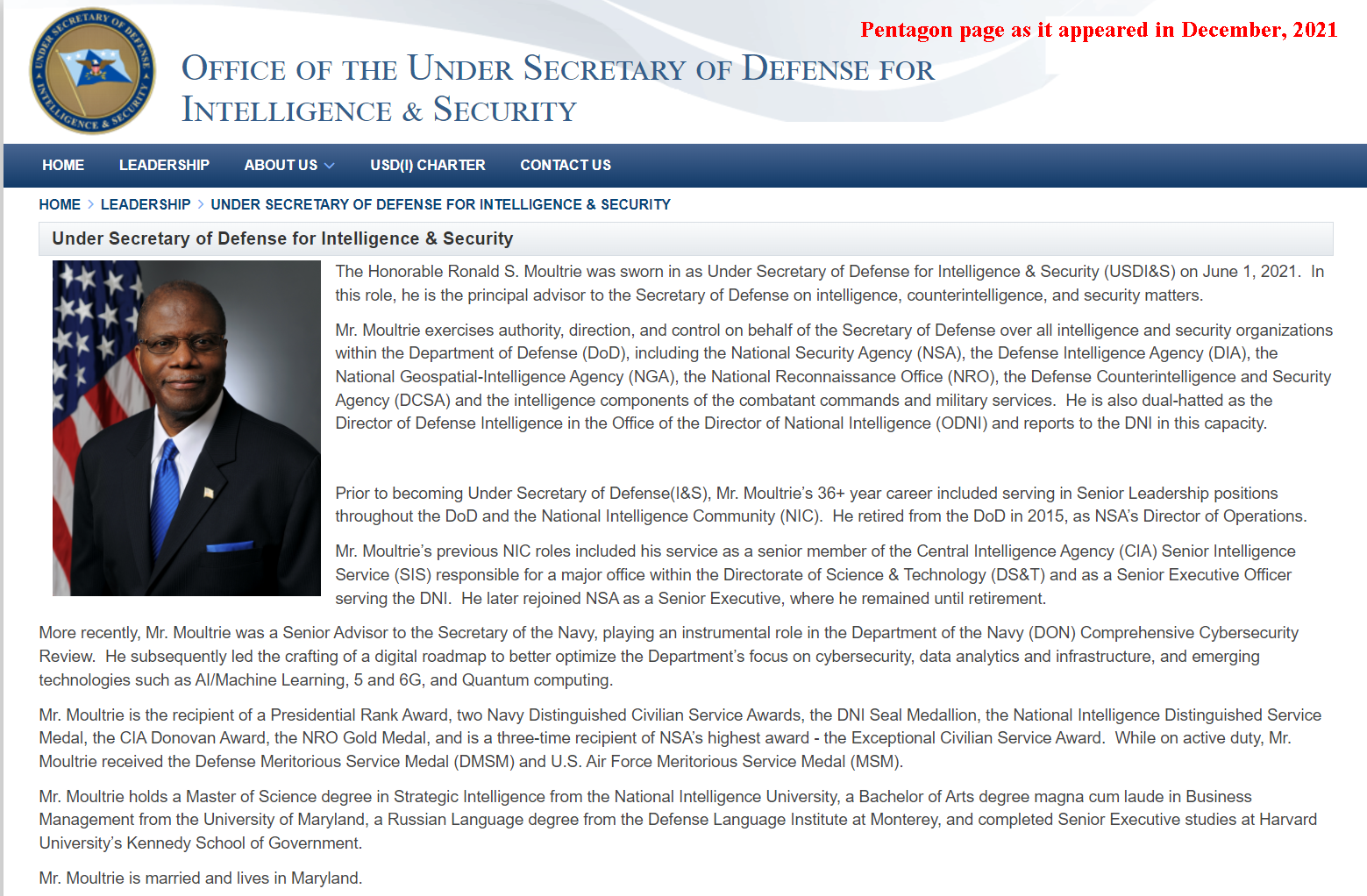
Key lawmakers apparently felt that the USD(I&S) had too much sway over AARO, so under a law enacted in December 2022 (Public Law 117-263) made changes intended to lessen the degree of the USD(I&S) control over AARO. For one thing, it specified that the actual appointment of an AARO director must be made "by the Secretary of Defense in consultation with the Director of National Intelligence." Probably more importantly, it also provided that the AARO director "shall report...to the Deputy Director of Defense and the Principal Deputy Director of National Intelligence"--referring to the second-ranking officials in those two agencies--"on all operational and security matters of [AARO]." [10]
However, on "all administrative matters," the post-2022 law requires that AARO director continues to report to the USD(I&S). Because of the continued linkage of AARO to the USD(I&S), and even more so because of the general nature of the matters that Congress has assigned to AARO, generally I would expect any USD(I&S) to continue to exercise some substantial influence on the selection of an AARO director.
However, USD(I&S) Moultrie resigned effective February 29, 2024, and the position of USD(I&S) is currently vacant, with its duties being handling by an acting Under Secretary. On May 2, 2024, President Biden nominated Tonya Wilkerson as USD(I&S). Wilkerson's nomination is currently pending in the Senate Armed Services Committee, which has not yet announced a date for a confirmation hearing. That hearing might not be soon, since the committee is currently focused on crafting the massive National Defense Authorization Act for Fiscal Year 2025, and is currently scheduled to vote on amendments to that bill on June 12-14, 2024. I wrote about Wilkerson's nomination and its implications for UAP matters in this article, published May 21, 2024.
WHAT QUALIFICATIONS AND ATTRIBUTES SHOULD BE POSSESSED BY AN AARO DIRECTOR?
With respect to carrying out the various missions and mandates contained in the successive statutes enacted by Congress, and advancing overall public understanding of UAP, what qualifications and experience should the next director possess? I received quite a variety of takes on that.
Retired Senate Armed Services Committee staffer Kirk McConnell commented:
The nominee should have the confidence and support of the Deputy Secretary and the Principal Deputy DNI, be committed to working with Congress, have both relevant technical and managerial expertise, be unafraid to accept and espouse unusual and unwelcome information, have a thick skin to withstand public criticism, and be respectful of those who mistrust the government’s handling of this issue.
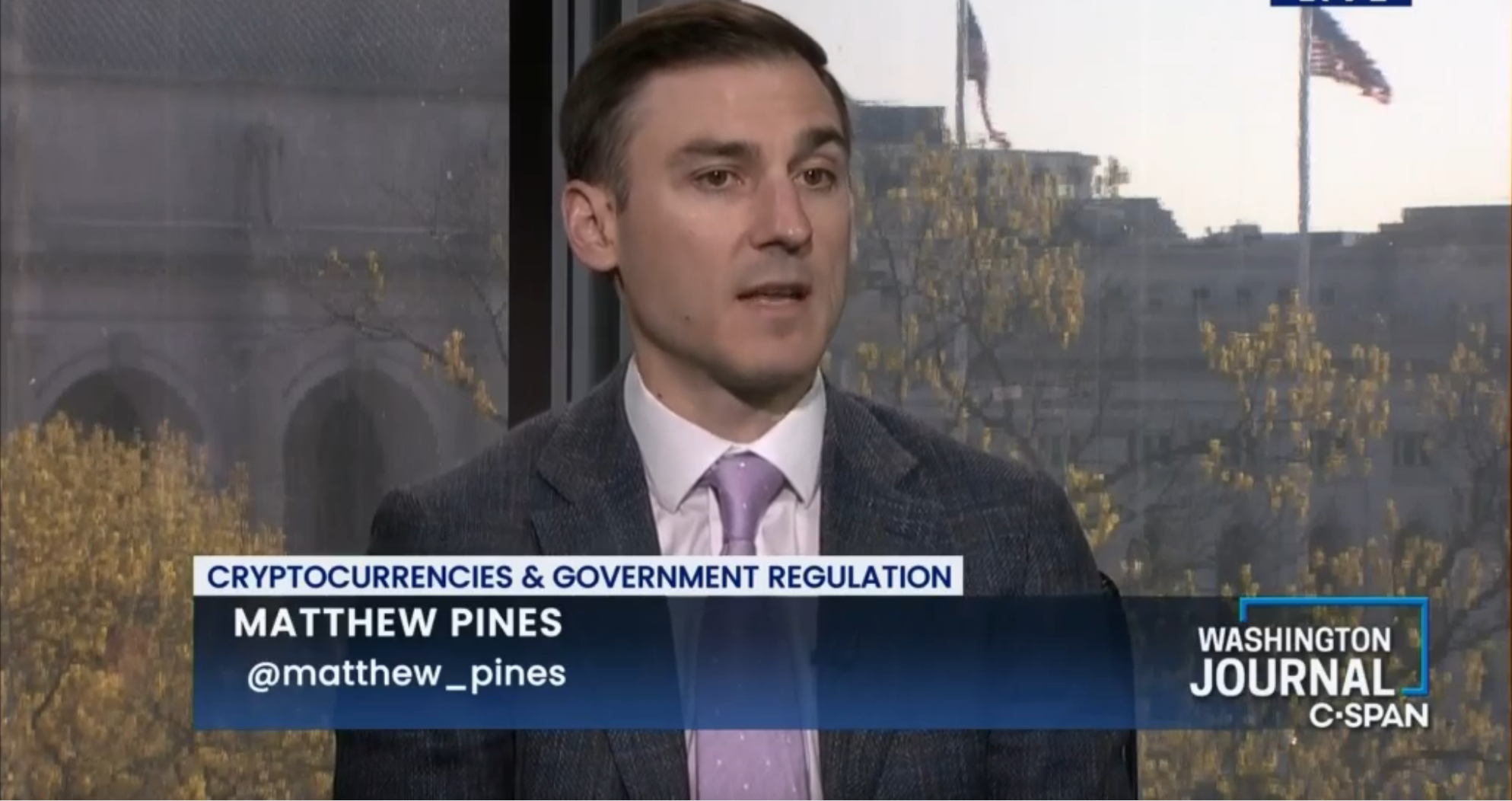
Matthew Pines, who directs the geopolitical and cybersecurity risk advisory practice for the PinnacleOne Strategic Advisory Group and who sometimes comments on UAP-related matters on X (@matthew_pines), said:
The position of AARO Director is very important. It is unusual for such a new office to rise so quickly in bureaucratic stature, with the AARO Director now required by law to report (operationally) directly to the number two leadership in both the DoD and the ODNI. Its importance is likely to be magnified given continued Congressional interest and potential future legislation (e.g., IAA and NDAA) impacting the office.
Pines also commented:
The AARO Director must have the trust and confidence of highly anxious and self-protective apparent witnesses to alleged legacy UAP-related activities in the federal government and contractor base. They must also have the technical, scientific, and analytic acumen to appreciate the full range of candidate explanations of UAP, which may stretch beyond, or require a novel reframing of, those presently circumscribed by official DoD language relating to "extraterrestrials." The new Director must recognize the function of AARO isn't just a traditional intelligence, operational, or S&T activity, but fundamentally an "investigatory" body, charged with proactively digging into the SAP architecture and requesting all legal authorities necessary to compel production of testimony and records to support their congressional reporting mandate. The Director shouldn't overstate the epistemic certainty of analytic conclusions based only on voluntary, and potentially delimited production, of relevant information by subjects of AARO investigations. (email, May 31, 2024)
Christopher Mellon said:
Ideally this individual would have extensive national security and intelligence experience as well as a demonstrated ability to deal effectively with the press and Capitol Hill. They should be credible and non-partisan. Genuine UAP expertise – a deep understanding of the history and the players – would also be extremely valuable. Hopefully they will be able to identify someone who is competent, knowledgeable, open-minded and non-partisan.
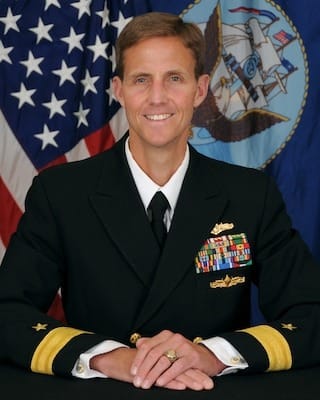
Tim Gallaudet, Ph.D., @GallaudetTim, a retired Navy rear admiral who also once served as Deputy NOAA Administrator, told me that he thought the AARO director should be a "qualified intelligence professional, preferably with a science and technical background/degree." He also said:
It is important to hire a qualified AARO Director to meet Congressional intent and ensure our DoD in general has component leadership. However, the AARO Director cannot change public policy on UAP. That person can recommend it, but it ultimately comes from political appointees in the NSC/SEDEF [National Security Council and Secretary of Defense] and DNI [Director of National Intelligence], with or without direction from the President (sometimes those offices do not elevate every issue to the President, and that may be the case with Biden). The AARO Director is merely a mouthpiece for their policy on UAP. Clearly, from AARO's last report, the policy is not only non-disclosure (despite Congressional intent), the policy also includes disinformation to discredit people like me who are advocating for disclosure. (email, May 30, 2024)
In a follow up response, Gallaudet clarified:
AARO has NOT discredited me personally. What I meant to say is that AARO's latest report is representative of a broader effort, potentially at USD(I), to spread disinformation about UAP and discredit advocates for disclosure.
Steven Greenstreet of the New York Post had a very different take:
[The next AARO Director should be] someone who can take the baton rather than going back to the starting line. In essence, AARO's real potential will never be met in they are unable to stop the domino fall of unfounded UFO stories. They'll never get out of that rabbit hole. The next director should continue Kirkpatrick's pursuit of evidentiary and science based investigation while completely discarding the unnecessary tall tales that've been a distraction for many years.
All that said, the intelligence community always has their own motive, needs and wants. Some of which, I'm sure, will conflict with the idea of full UAP "transparency" and, perhaps, conflict with AARO's ability to truly, at least publicly, "get to the bottom of it." (messaged June 2, 2024)
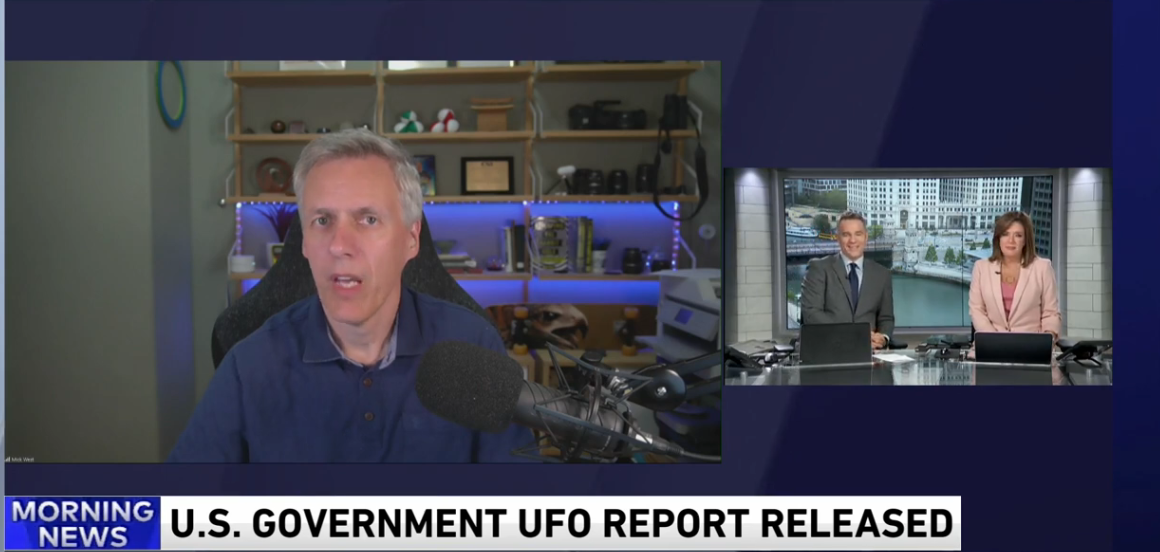
Mick West, @MickWest, a writer and investigator who is highly visible as a skeptic of non-prosaic theories for UFOs, said:
AARO is in a unique position to analyze cases like Gimbal and Aguadilla that have fascinated and concerned the public for some time. This analysis can be complicated, so it's important that they get a well-qualified leader to steer the process and ensure the results are accurately and convincingly presented to the public. The next leader of AARO should be someone with proven leadership and organization skills, but should also be someone with a strong engineering and mathematical background, familiar with sensor technology, video analysis, and AI. Perhaps someone with experience in the unorthodox engineering needed for foreign technology exploitation, like at NASIC [the National Air and Space Intelligence Center, a component of the U.S. Air Force]. (email, May 30, 2024)
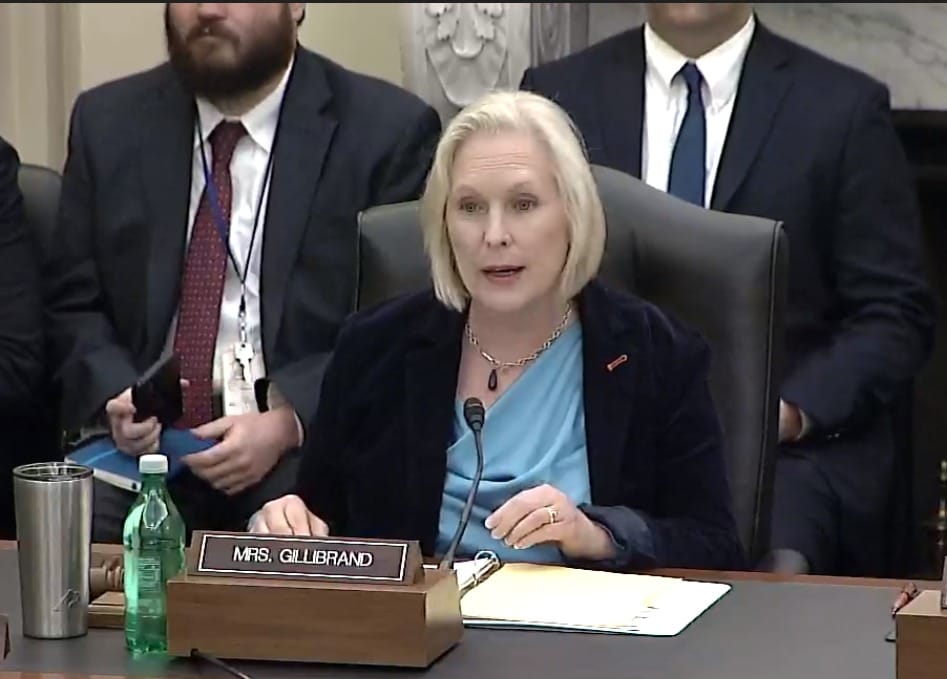
Perhaps AARO's most prominent backer in Congress has been Senator Kirsten Gillibrand (D-NY), who was the prime Senate sponsor of the 2021 legislation that created the office now called AARO. Gillibrand also chairs the Emerging Threats and Capabilities Subcommittee of the Senate Armed Services Committee, the subcommittee that is exercising oversight jurisdiction over AARO.
By all appearances, Gillibrand held former AARO Director Kirkpatrick in high regard, and it appears that she still intends to rely a great deal on guidance from AARO leadership. In a May 2, 2024 interview with journalist Matt Laslo, Gillibrand said that she had met with two would-be UAP "whistleblowers," but "the two whistleblowers that I've met with did not meet with AARO and refused to meet with AARO. And so maybe the next director they'll meet with. But I can't assess them unless AARO can talk to them, because AARO knows [i.e., AARO can check out] what they know and what they've seen and what they've been shown." [boldface added for emphasis]
CANDIDATES FOR AARO DIRECTOR
[UPDATE: As noted in an update inserted above, on August 26, 2024, the Pentagon announced the appointment of Jon T. Kosloski, Ph.D., as the new AARO director.]
In preparing this article, I encountered clues that led me to believe that two specific individuals may be among the candidates for the AARO directorship– Michael F. Waschull and Timothy A. Phillips. I have no direct confirmation from either man or any official source, but I think the information I received has sufficient substance to justify extending this article to provide a little information about them. I have little doubt that there are many other possible candidates of whom I know nothing. If I update this article later to update the information on potential candidates, those revisions will be noted in a log at the end of the article, as is my standard practice.
MICHAEL F. WASCHULL
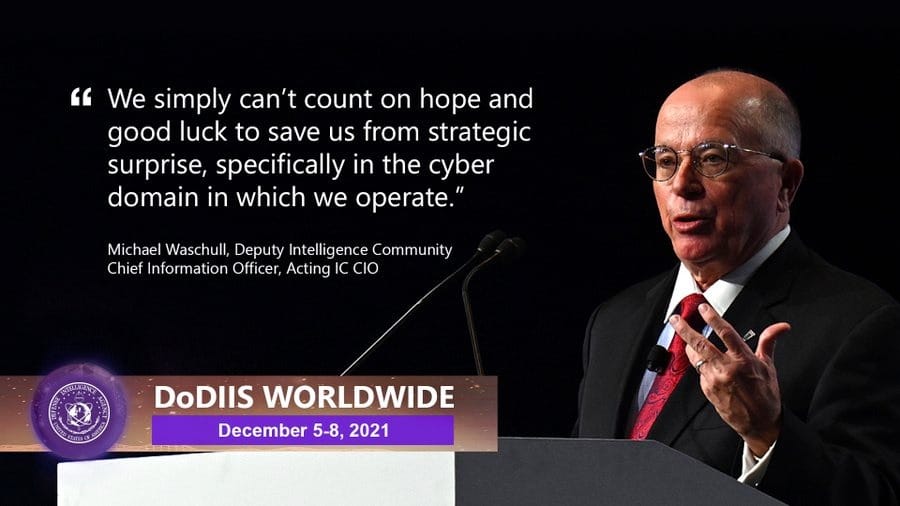
Michael F. Waschull since 2020 has served as Deputy Chief Information Officer in the Office of the Director of National Intelligence.
This information that I received is enough to persuade me that Waschull is at least on some kind of list for consideration for the AARO directorship, but falls far short of confirmation that he is the leading candidate or even that he would want the job. I emailed Waschull on May 24, 2024 and again on May 27, inquiring about the reports that had reached my ears, but so far I have received no reply.
Waschull, age 68, has held jobs in the military and the Intelligence Community since age 18. He joined the U.S. Air Force at about age 18, in 1973, originally as an enlisted man, but was later commissioned. According to a 2019 article posted on the website of the Office of the Director of National Intelligence, "As an Air Force enlisted technician working communications and computers, he transitioned to the role of an Air Force intelligence officer." The same article stated, "While serving as a Captain, Waschull was the founding Program Manager for the Joint Worldwide Intelligence Communications System (JWICS) at DIA [Defense Intelligence Agency]. During his five years at DIA, Waschull retired from the Air Force [in 1993] and transitioned to his first role as a government civilian employee..."
Waschull's time at the DIA spanned 1993-1998. After that, he worked at the Office of the Secretary of Defense (as Director of Intelligence Policy, 1999-2002), the Missile Defense Agency (2002-2011); the Office of Naval Intelligence (2011-2017), including time as deputy commander; and the National Counterproliferation Center. He holds a Master of Science degree from Roosevelt University (1989).
If Waschull has ever said anything publicly directly about Unidentified Anomalous Phenomena or UFOs, I did not find it. But I did find two instances in which Waschull said nice things about people who were talking about UFOs.
In November 2019, the Congress-focused publication The Hill published an opinion piece by former Christopher Mellon, titled, "The Navy acknowledges UFOs– so why aren't they on Washington's radar?" Mellon posted a link to the article on his account on LinkedIn, a professional networking site. Waschull, identified as "senior Navy executive representative to the DoD/OSD Advanced Intelligence Capabilities Office," posted this comment: "Chris Mellon is my exemplar of 'noblesse oblige'– a high integrity, focused, patriotic, realist. If Chris is talking, I am listening."
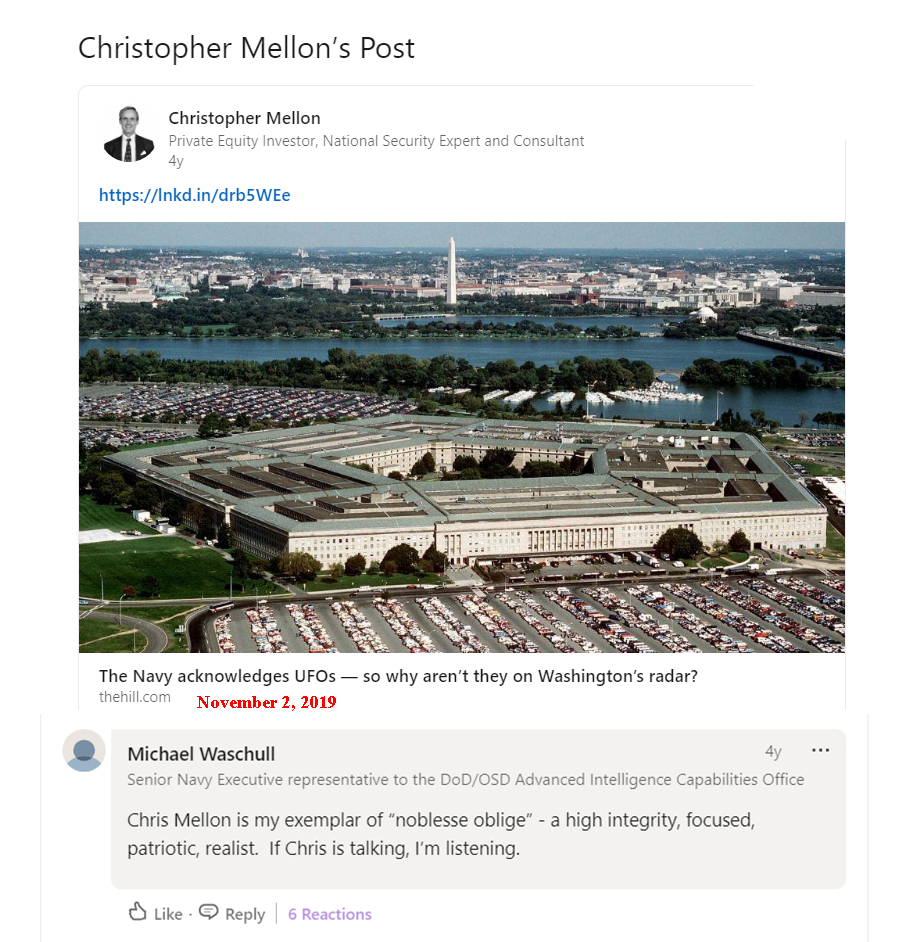
When I asked Mellon specifically about Waschull, he responded: "As it happens, Michael Waschull worked for me as a direct report many years ago in the Pentagon. Due to his integrity, attitude, effectiveness and work ethic I promoted him to the ranks of the Senior Executive Service when a vacancy developed. We’ve kept in touch and Mike still exhibits the same positive attitude and strong work ethic that I recall. I have no doubt he would be straight with Congress and able to apply his organizational skills and extensive government experience to good effect."
In April 2024, Tim Gallaudet posted on LinkedIn about a just-published paper discussing "aspects of anomalous phenomena in the ocean," with a link to a FoxNews.com story quoting Gallaudet, headlined, "Underwater UFOs display capability that 'jeopardizes US maritime security,' ex-Navy officer says." Waschull posted this comment: "Fox News has no class. Admiral Gallaudet is a former Naval officer honorably retired– the 'ex' is an insult! He's not an 'ex' anything! Get it right. Words are important."
When I asked Gallaudet specifically about Waschull, he replied by email: "Mike would be an excellent choice, and I have known him for years. He would do his duty, but policy will come from political appointees."
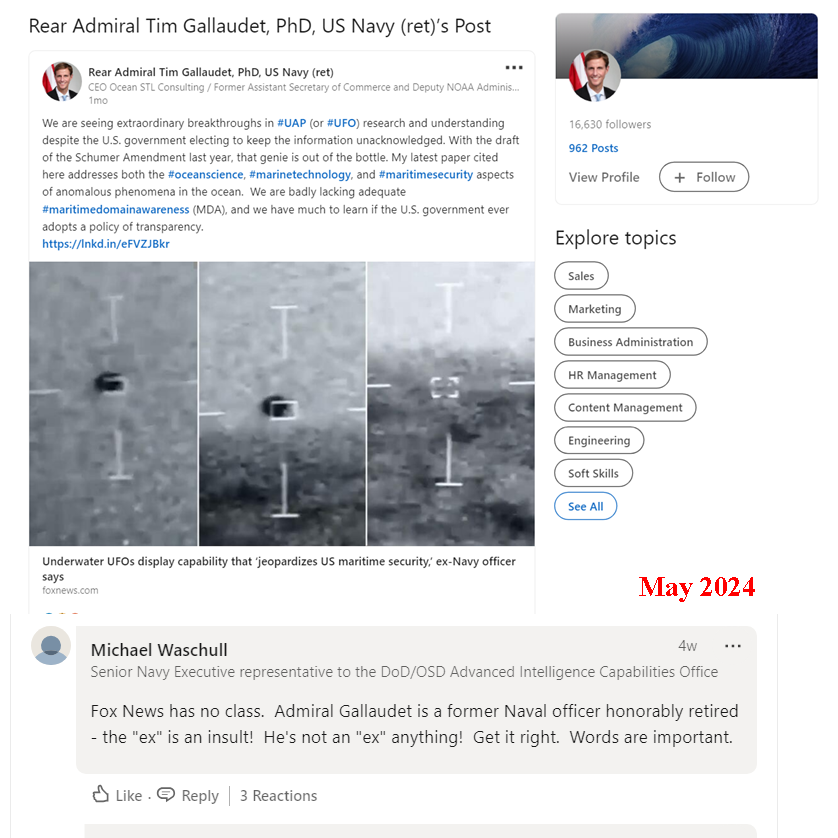
TIMOTHY PHILLIPS: DEPUTY DIRECTOR AND ACTING DIRECTOR
I do not know much about Timothy A. Phillips, other than what one might glean from his official biographical sketch as posted on the AARO website (inserted below), or from reviewing his presentation to a handful of Pentagon-picked journalists on March 6, 2024, where he discussed the contents of AARO's Volume I historical report and other aspects of AARO's ongoing work.
At that event, Phillips said, "I don't think there's ever been a government organization with the authorities and with the amount of funding that we receive from Congress. As the acting director, I work for the Deputy Director of Defense....trying to get information, we've actually had to solicit her personal assistance to open a door. I don't believe any previous government attempt to research UFOs, UAPs has ever had that type of top cover."
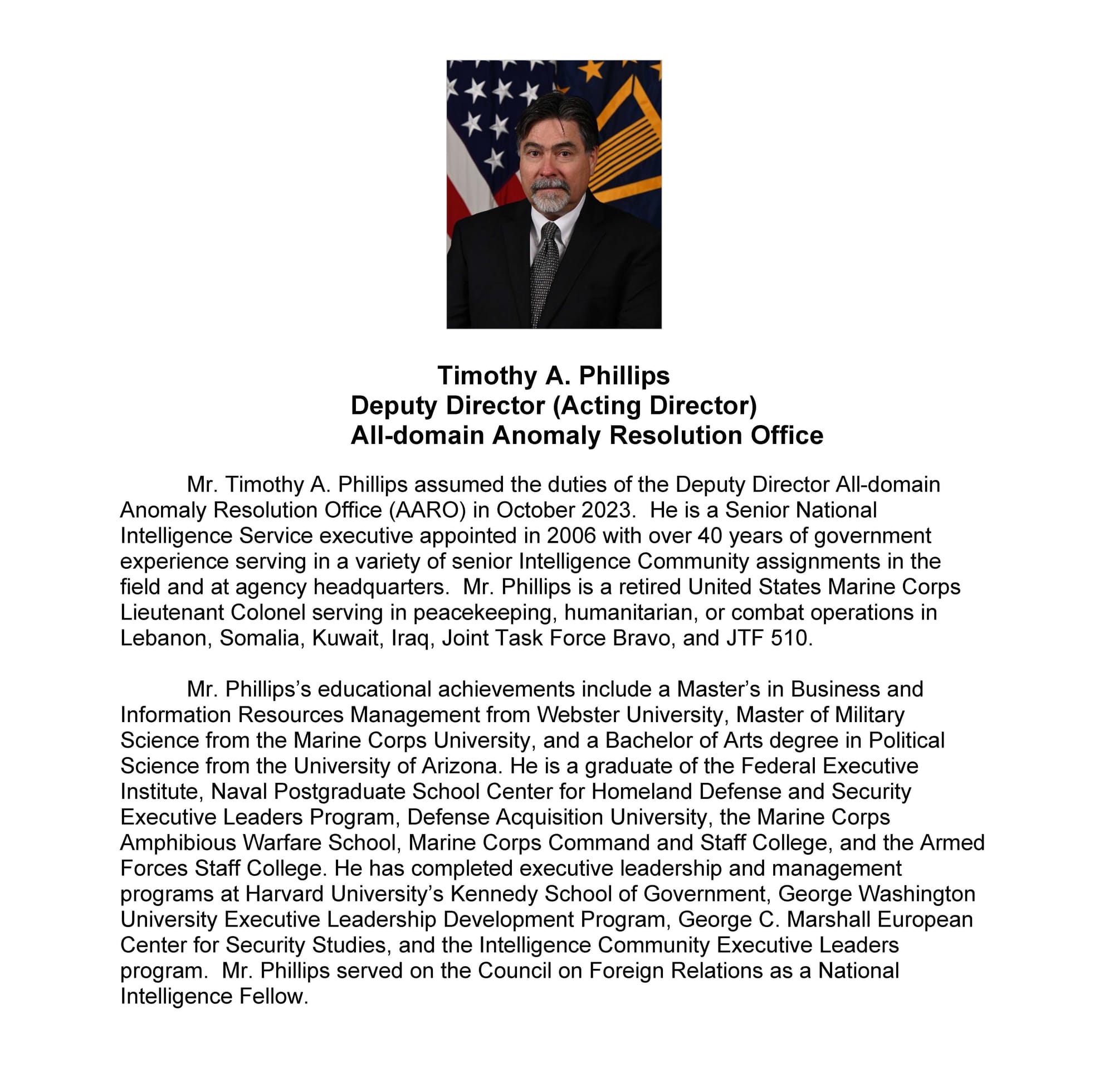
In her May 2, 2024 interview with journalist Matt Laslo, Gillibrand said she had met with Phillips, and that the meeting went "very well." Gillibrand seemed impressed with Phillips; she told Laslo:
I think he's incredibly competent. He was working with Dr. [Sean] Kirkpatrick all along. I let him know that I'd like to have a public hearing this summer. And so he's going to put together some data and information to disclose in a public hearing to show what work they've done, especially examples of things that were unknown that they've been able to figure out and examples of things that were unknown that they still haven't figured out…
On May 29, 2024, I queried Sen. Gillibrand's office as to whether she believed that the Department of Defense was taking too long to nominate a new director, her overall satisfaction level with respect to "the approach that AARO has taken with respect to looking for hidden UFO-related data or technology," and her views on candidates for the directorship, but to date I have received no reply.
END NOTES
[1] In 2023, some members of Congress, led by Senate Majority Leader Charles Schumer (D-NY) and Senator Mike Rounds (R-SD), proposed an alternative approach to uncovering and disclosing the complete history of U.S. government involvement with UFOs– a presidentially appointed, Senate-confirmed review board, with substantial staff and resources, patterned on the JFK Records Act. This measure, titled the Unidentified Anomalous Phenomena Disclosure Act (UAPDA), passed the Senate on July 27, 2023, as part of the FY 2024 National Defense Authorization Act (NDAA). But it was largely gutted in conference with the House of Representatives, due largely to opposition from the Pentagon. A much narrower, weaker provision was enacted, requiring the National Archives and Records Administration to undertake collection of UAP-related documents (poorly defined) from throughout the government. However, there have been recent indications that some lawmakers may make another attempt to enact the original UAPDA proposal during upcoming consideration of the Fiscal Year 2025 National Defense Authorization Act.
A December 13, 2023 Senate floor colloquy between Senate Majority Leader Schumer and Senator Rounds, discussing the legislative outcome last year, is embedded below as a video. Also below is the colloquy as it appeared in the Congressional Record.
Senate Majority Leader Charles Schumer (D-NY) and Senator Mike Rounds (R-SD) engage in a Senate floor colloquy regarding the demise of their UAP Disclosure Act (December 13, 2023).
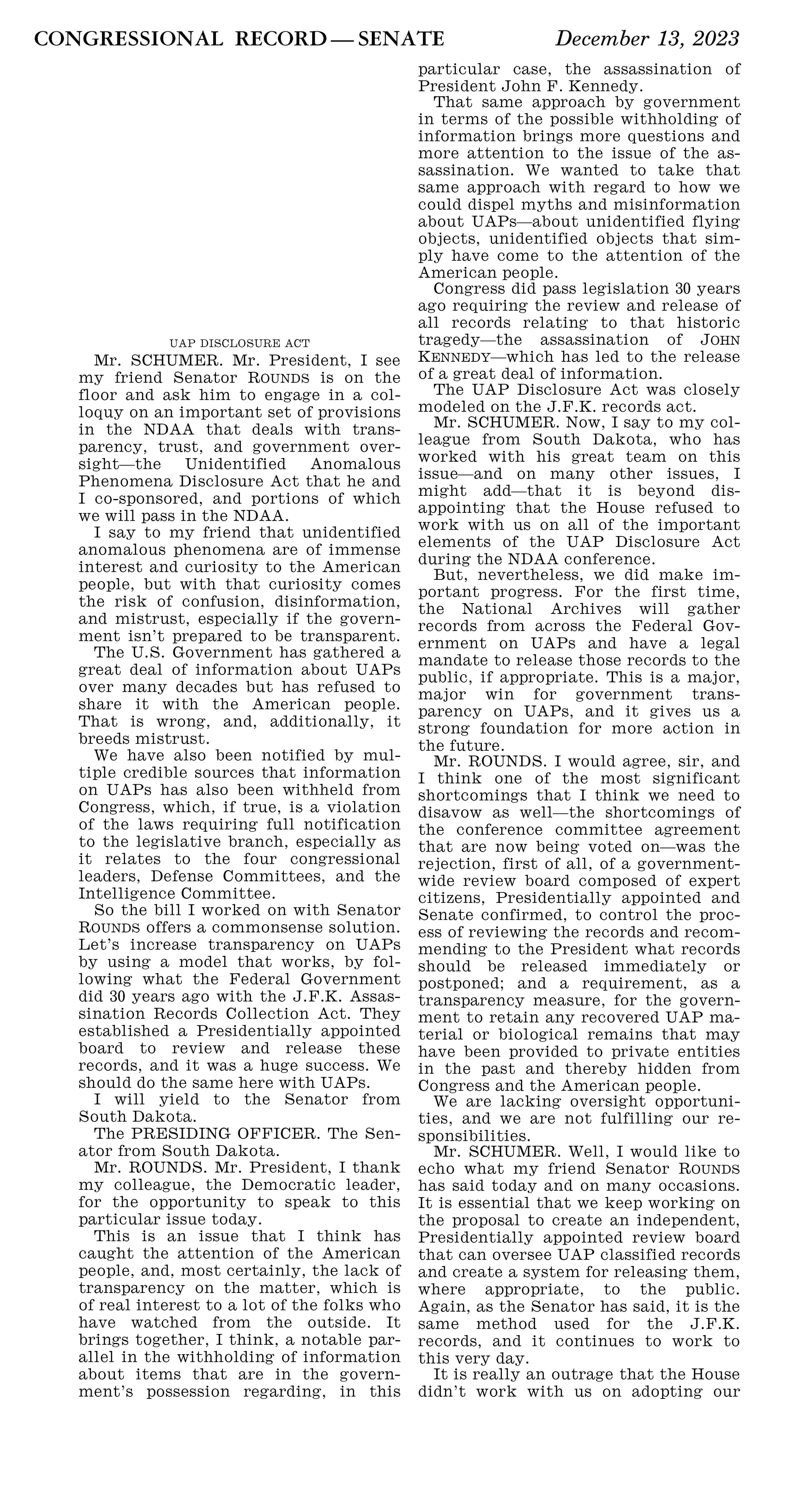
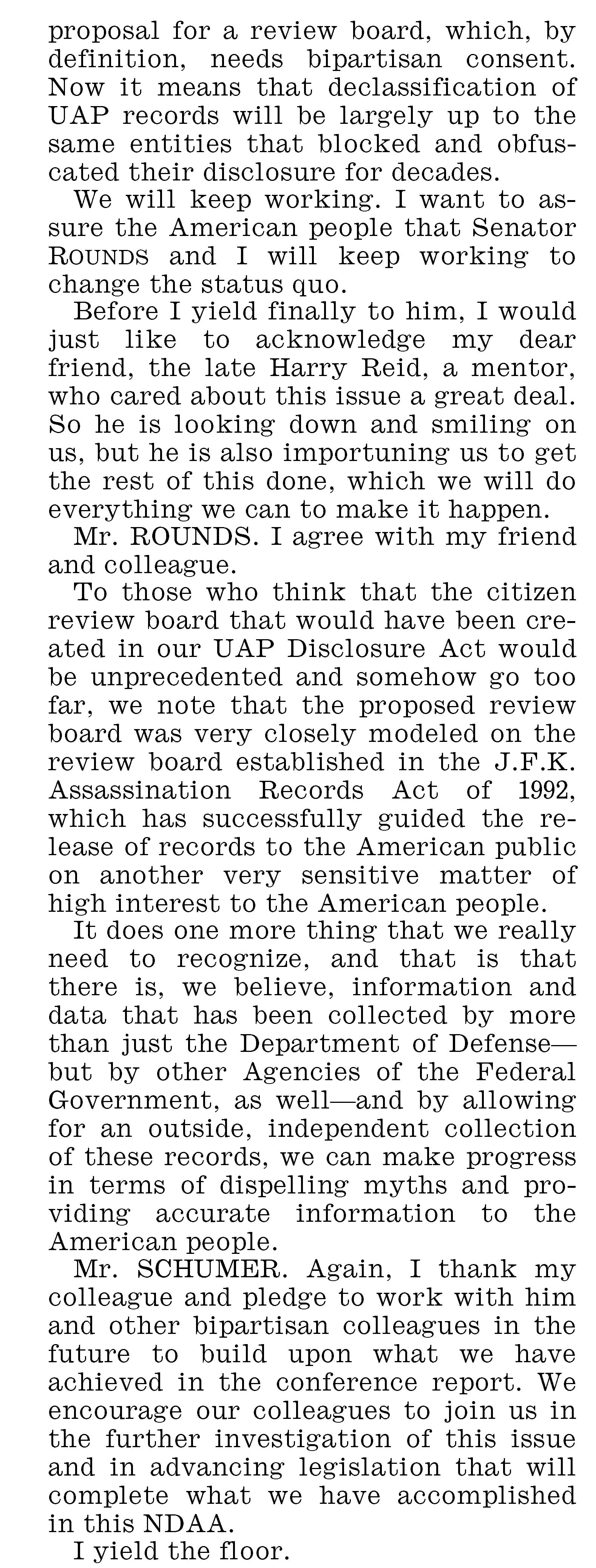
[1A] Some have criticized my application of the term "whistleblower" to David Grusch, since his allegations of secret government alien-technology programs and reprisals directed against him have not, at the time of this writing, been validated by any official adjudicative processes nor otherwise publicly documented. However, in a long post on X on June 22, 2024, I argued that the term "whistleblower" is appropriate as applied to someone, such as Grusch, who has employed mechanisms provided under certain federal whistleblower laws, and whose allegations have not yet (as far as I know) been resolved or found to be without merit. In contrast, I argued, it would not be appropriate to apply the term "whistleblower" to someone who merely tells stories, without employing processes established by law by which allegations may be systematically investigated and placed under critical scrutiny and challenge – people such as, for example, the scientist-impersonating serial scam artist and felon, Bob Lazar (the pretended possessor of a super-powered alien isotope that can defeat gravity and generate power like the sun).
[2] For example, the AARO Volume I report thoroughly repudiated a document purporting to be a 1961 "Special National Intellegence [sic] Estimate," referring to crashed UFOs, issued by "U.S. INTELLIGENCE COMMUNITY AND MJTWELVE OPERATIONS." (AARO report, p. 31) This document is crude and obvious hoax, as commentators such as Barry Greenwood, Paul James Dean, John Greenewald, and I have thoroughly demonstrated in years past – notwithstanding that it has been personally vouched for by physicist Eric Davis. The AARO historical investigation also uncovered and arranged for the declassification and release of illuminating documents about KONA BLUE, an unsuccessful 2012 attempt to establish a UAP-focused special access project within the Department of Homeland Security.
[3] The AARO report conclusions were based in part on interviews with only about 30 persons, only some of whom claimed information related to purported government UAP programs. The report summarized:
AARO assesses that all of the named and described alleged hidden UAP reverse-engineering programs provided by the interviewees either do not exist; are misidentified authentic, highly sensitive national security programs that are not related to extraterrestrial technology exploitation; or resolve to an unwarranted and disestablished program. AARO created a secure process in partnership with the highest-level security officials within the DoD, IC, and other organizations to research and investigate these programs; AARO was granted full, unrestricted access by all organizations. It is important to note that none of the interviewees had firsthand knowledge of these programs– there were not approved for access to nor did they work on these efforts– which likely resulted in misinterpretation of the programs' origins and purposes. (p. 9)
Notwithstanding that language, at another point in the report, AARO did not claim to have resolved every reverse-engineering story that it received, stating: "AARO has no evidence for the USG reverse-engineering narrative provided by interviewees and has been able to disprove the majority of the interviewees claims. Some claims are still under evaluation." (p. 10) Volume I also stated, "AARO remains open to additional, verifiable information that may alter the conclusions rendered in Volume I and will note any changes to the findings in this report in Volume II." (p. 12). And, "AARO continues to conduct interviews, research programs, and pursue investigatory leads..." (p. 36)
In his interview with Kirkpatrick posted on May 8, 2024, Steven Greenstreet asked Kirkpatrick, "Is it possible that you are, unknowingly, part of a cover-up to hide aliens or non-human intelligence?" Kirkpatrick replied dryly, "Not likely."
[3A] In an interview with journalist Matt Laslo on June 18, 2024, Senator Kirsten Gillibrand (D-NY) said, "For example, I don't know if there are presidential SAPs. Meaning, I don't know if there's legal structure, under our framework, for presidents to put Special Access Programs for president eyes only. And if that exists, then I don't know about it. But I don't think that should exist based on balance of powers and based on the fact that Congress is responsible for allocating money." In fact, it is a matter of record that there are or have been some special access programs that are run out of the Executive Office of the President, dealing with such things as protection of the president and continuity of government, and quite likely there are others on topics unknown to the public. In addition to the various existing laws requiring the Department of Defense, intelligence agencies, the Department of Energy, and other federal agencies to notify designated lawmakers about special access programs, Congress in 2022 enacted 50 USC §3348a, requiring notice to the four top congressional leaders of any special access program "established at the direction of the President."
[4] British blogger Christopher Sharp, in a March 15, 2024 post on his blog Liberation Times headlined "Top Intelligence Office Unable To Publicly Support Pentagon's UFO Report, Despite Oversight Role," included a fragmentary quote attributed to Eric Pahon, who is public affairs advisor to Deputy Secretary of Defense Kathleen Hicks, as follows: "she [Hicks] supports the findings and conclusions in the report." I have found no other source in which Pahon or Hicks have been quoted regarding the AARO report. My email inquiries to Pahon on March 21, March 23, April 15, and April 25, 2024, brought no response, nor did inquiries to Pentagon spokeswoman Susan Gough on March 23, April 15, and April 25, 2024. [UPDATE: Sharp, on his X account on June 8, 2024, posted the screenshot shown below of the reply he received from Pahon on March 14, 2024.]
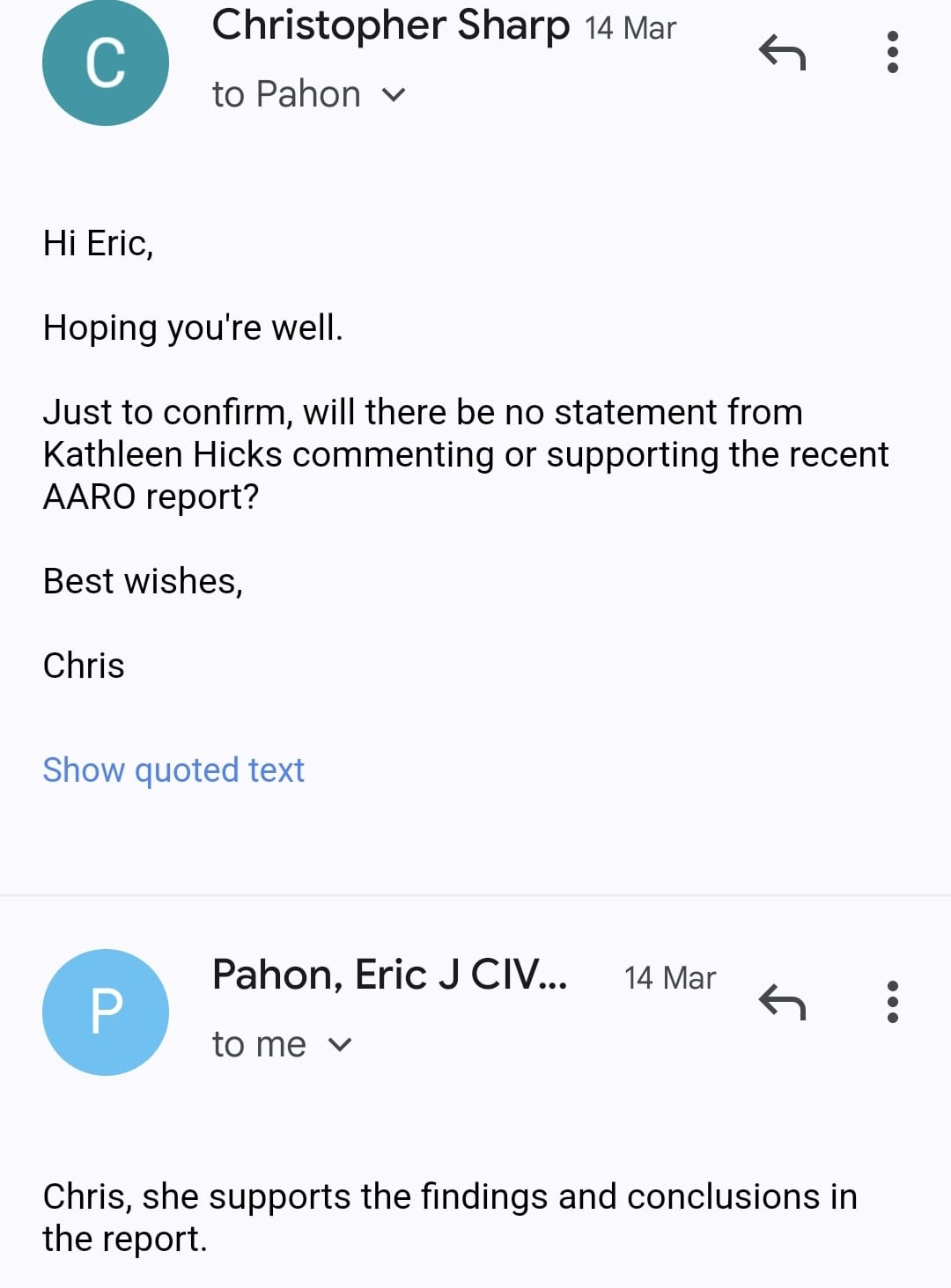
[5] In recent congressional testimony, one Biden Administration cabinet secretary had no hesitation in referring to the AARO Volume I historical study as authoritative. During a May 23, 2024 appearance before the Oversight and Accountability Committee of the U.S. House of Representatives, Congressman Tim Burchett (R-TN) asked Secretary of Energy Jennifer Granholm about UFO incidents associated with nuclear sites. Granholm responded, "The Defense Department has said there is no evidence of UFOs, et cetera, or aliens, in the United States. However, at those sites, there may be drones that may be nefarious..." Later during the same hearing, Congresswoman Anna Paulina Luna (R-FL) asked Granholm about any current or past Department of Energy role in "reverse engineering technologies recovered from UAP." Granholm replied, "I have no knowledge of that."
[6] In my view, evidence of an active investigation by the Inspector General of the Intelligence Community (ICIG) would be, for example, credible on-the-record reports by identified individuals who were contacted by ICIG investigators regarding purported reverse-engineering programs. It would not include interactions with the ICIG that were merely the product of a would-be whistleblower himself initiating a contact by utilization of the ICIG hotline.
[7] I sent Sean Kirkpatrick's April 22, 2024 statement about the ICIG to Congressman Tim Burchett (R-TN), a member of the House Oversight Committee who has participated in multiple classified briefings on UAP matters, including one presented by ICIG Thomas A. Monheim on January 12, 2024. I asked, "Does Mr. Burchett believe that the ICIG or the Justice Department are independently investigating David Grusch's allegations, or does Mr. Burchett believe that there is no ICIG or Justice Department investigation underway?" Burchett's verbatim reply: "I have no faith in anyone investigating this issue. We have been stonewalled from day one, and I would hope Congress would consider stopping funding for these agencies." (email, May 9, 2024) Similar inquiries to the offices of Senator Marco Rubio (R-FL) and Congressman Jared Moskowitz (D-FL) brought no response.
[8] Like Sean Kirkpatrick, Tim Phillips has signaled that he would prefer for AARO to be relieved of obligations to study historical records or "whistleblower" accounts. During a Pentagon-sponsored session with a small number of hand-picked reporters on March 6, 2024, Phillips, referring to the just-released Volume I historical report, said:
In a way, I'm really happy to get this behind us because look, I want to support the warfighter. I want to go after the cases that we received this week. That's where I want to be. I want to have my officers out in the field, you know, talking to witnesses, trying to gather and preserve evidence, trying to work with the services and the other departments in the government on how to preserve data when there is an incident, helping to write force protection standards so I can capture this in real-time. Doing it forensically after the fact is difficult. You know, as a marine and as an Intel officer, I want to be ahead of my opponent. And I want to capture it in real-time.
[9] Since initial publication of this article on June 7, 2024, several people have asked me if I know the identities of the two skittish whistleblowers to whom Senator Kirsten Gillibrand referred during her May 2, 2024 interview by Matt Laslo. I do not. In Sean Kirkpatrick's email response to me of June 7, 2024, he clearly suggested that David Grusch was one of the two, but maybe not: In the Laslo-Gillibrand exchange, Gillibrand referred to "two whistleblowers that I've met with [who] did not meet with AARO," after which Laslo asked, "Have you met with David Grusch yet?," to which Gillibrand responded in the negative.
[10] The Pentagon was slow in implementing the changes in AARO's structure that Congress that were mandated in the FY 2023 National Defense Authorization Act, Public Law 117-263, enacted December 23, 2022. On April 27, 2023, the chairman and ranking minority member of the Senate Select Committee on Intelligence– Senator Mark Warner (D-VA) and Senator Marco Rubio (R-FL), respectively – sent a letter to Secretary of Defense Lloyd Austin and Director of National Intelligence Avril Haines, expressing "concerns about the slow implementation" of the changes, and prodding the two cabinet-level recipients to act on five specific matters. The letter concluded, "To date, we are cautiously optimistic about the limited progress made by AARO, and we support the considerable efforts of the AARO Director, Dr. Sean Kirkpatrick, to meet Congressional intent." An image of the letter appears below.
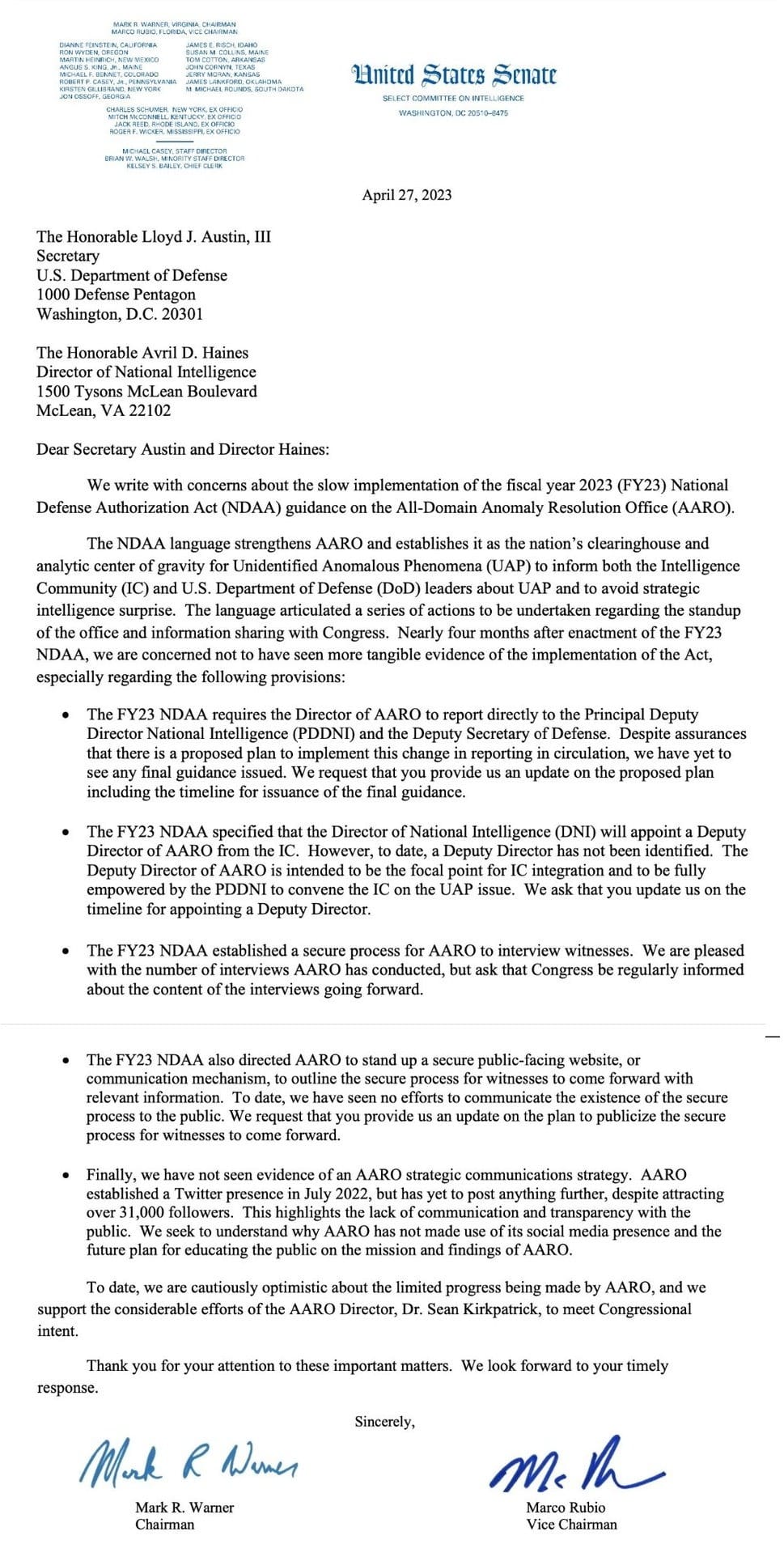
#######################################################
LOG OF SUBSTANTIVE REVISIONS SINCE INITIAL PUBLICATION OF THIS ARTICLE ON JUNE 7, 2024:
- June 9, 2024. Updated End Note No. 4 to include screenshot of March 14, 2024 exchange between Christopher Sharp and Eric Pahon.
- June 9, 2024: Corrected date of interview of Sean Kirkpatrick by Chris Williams of the Moorman Center for Space Studies, National Security Space Association. The interview occurred on March 14, 2024, and was posted on YouTube on March 19, 2024. The article originally dated the interview as March 20, 2024.
- June 11, 2024: Added End Note No. 9.
- June 22, 2024: Added End Note No. 3A.
- June 23, 2024: Added End Note No. 1A and End Note No. 10.
- August 27, 2024: In two places, inserted updates on the August 26, 2024 Pentagon announcement of the appointment of Jon T. Kosloski, Ph.D., as the new AARO director. In addition, inserted an update quoting a report on DefenseScoop.com on August 26 in which Pentagon spokesman Maj. Gen. Pat Ryder stated that AARO staff continues to work on the second volume of the historical review, but he had nothing to announce regarding the timing of that report.
- August 29, 2024: Noted that with the naming of Jon T. Kosolski as AARO director on August 26, 2024, Timothy Phillips continued in his previous position as deputy director.